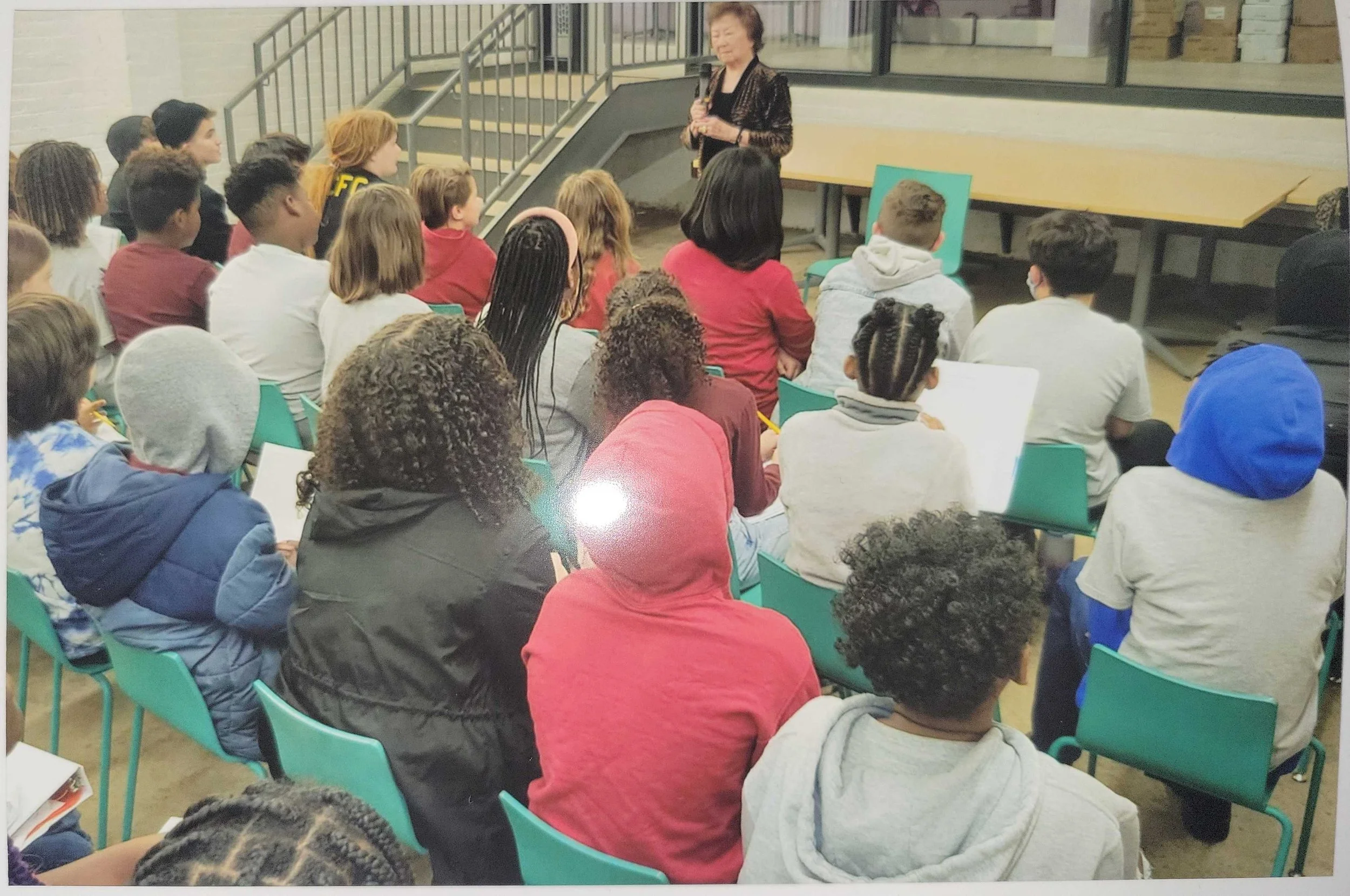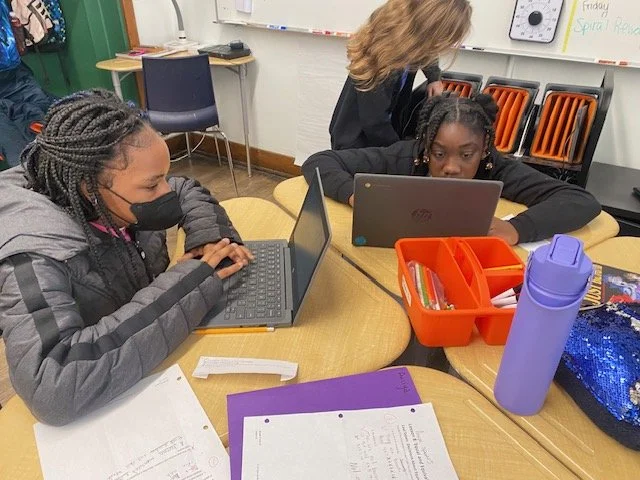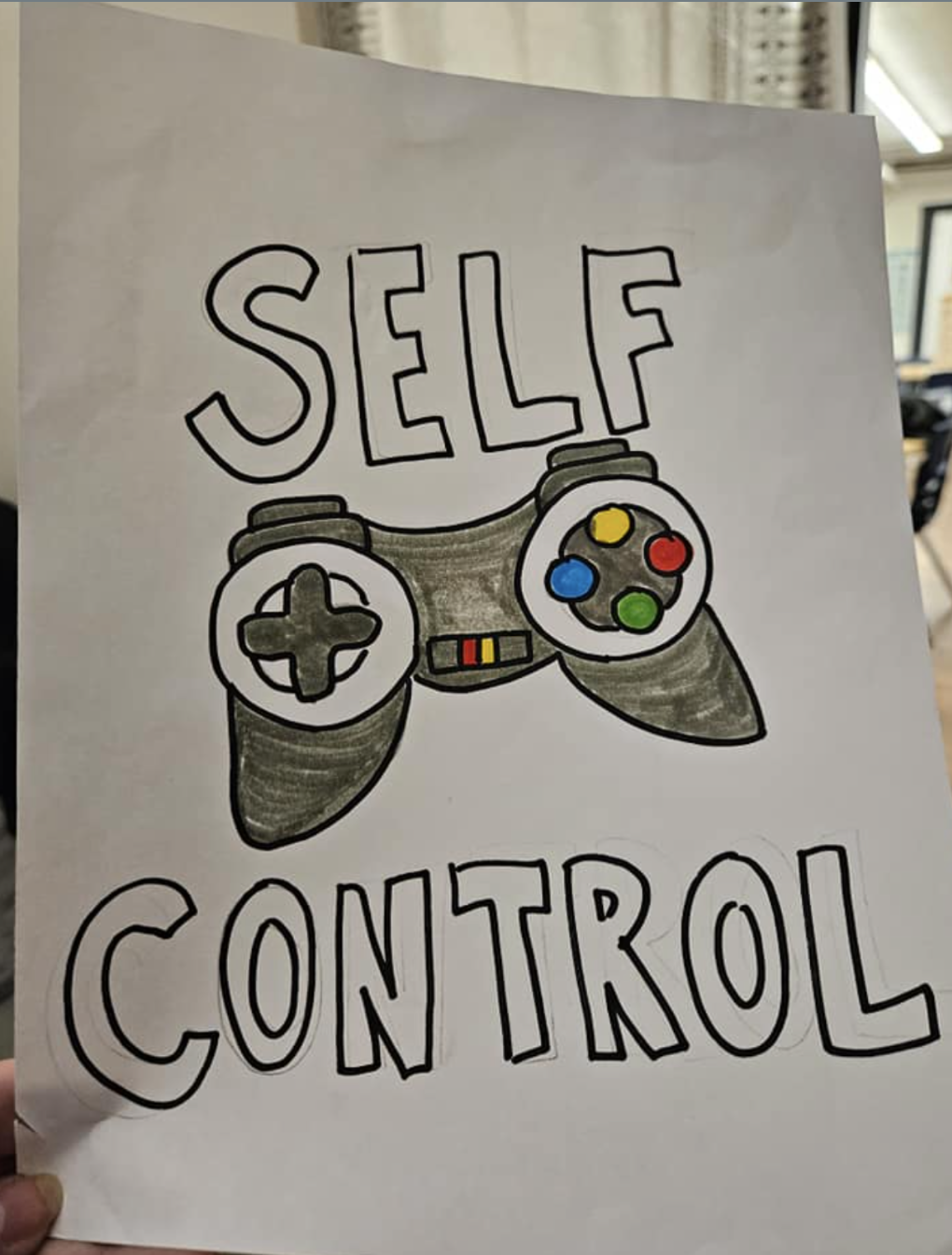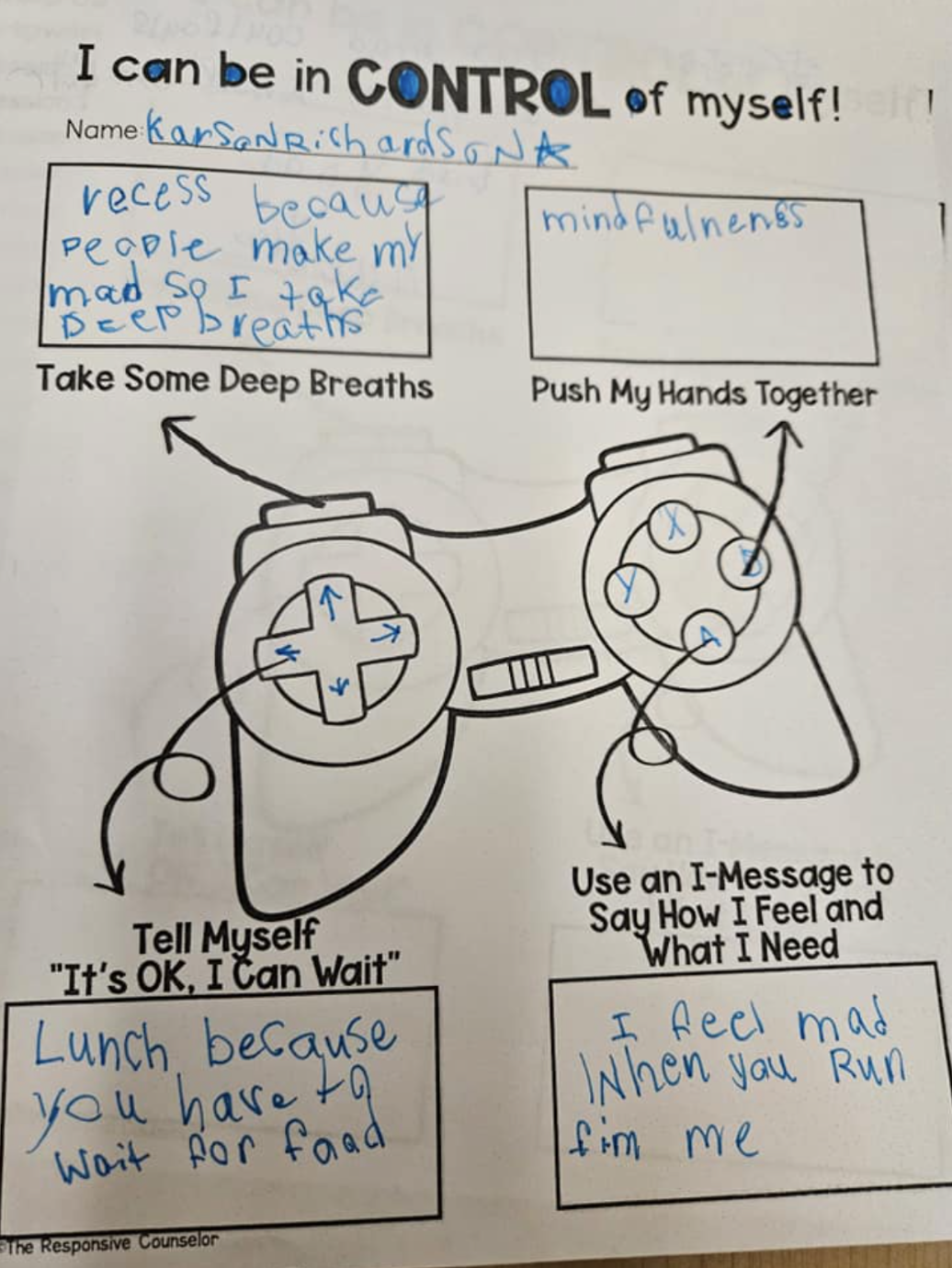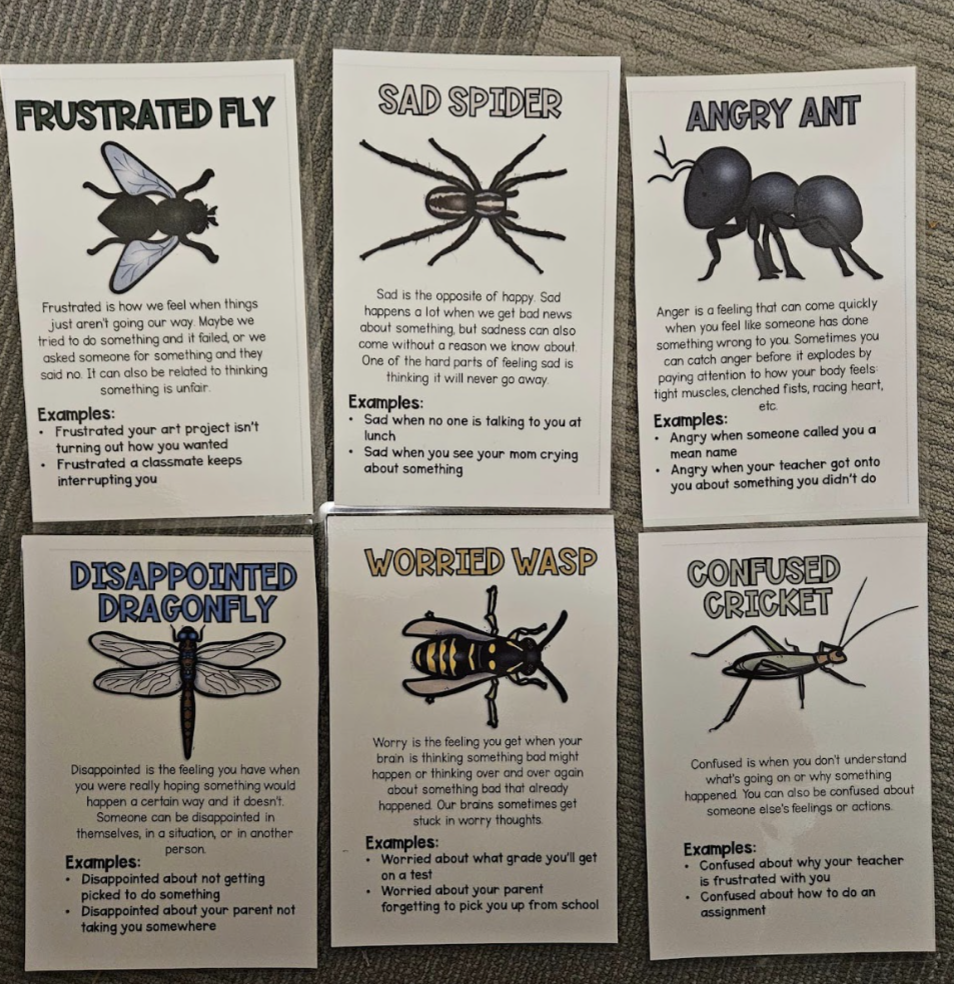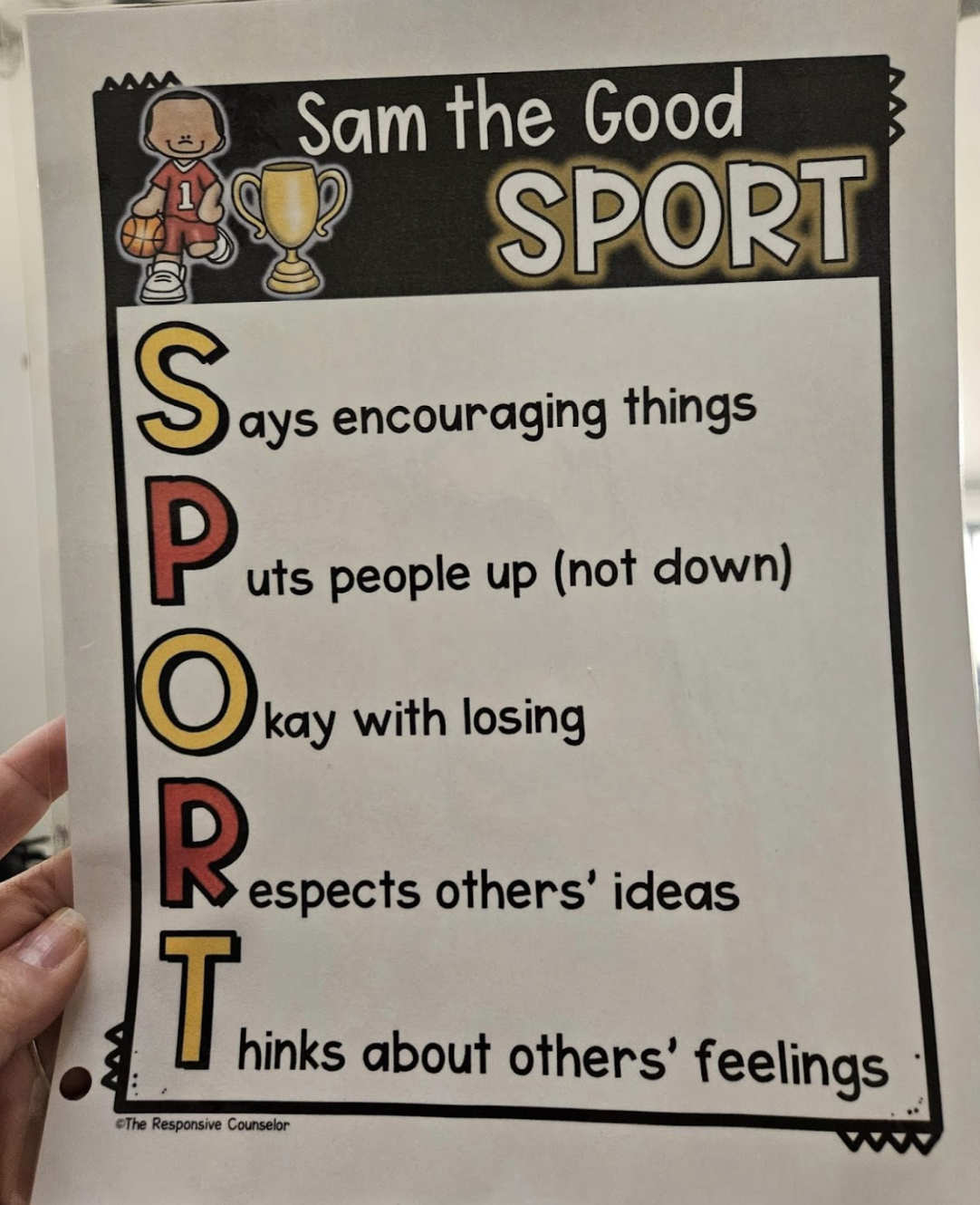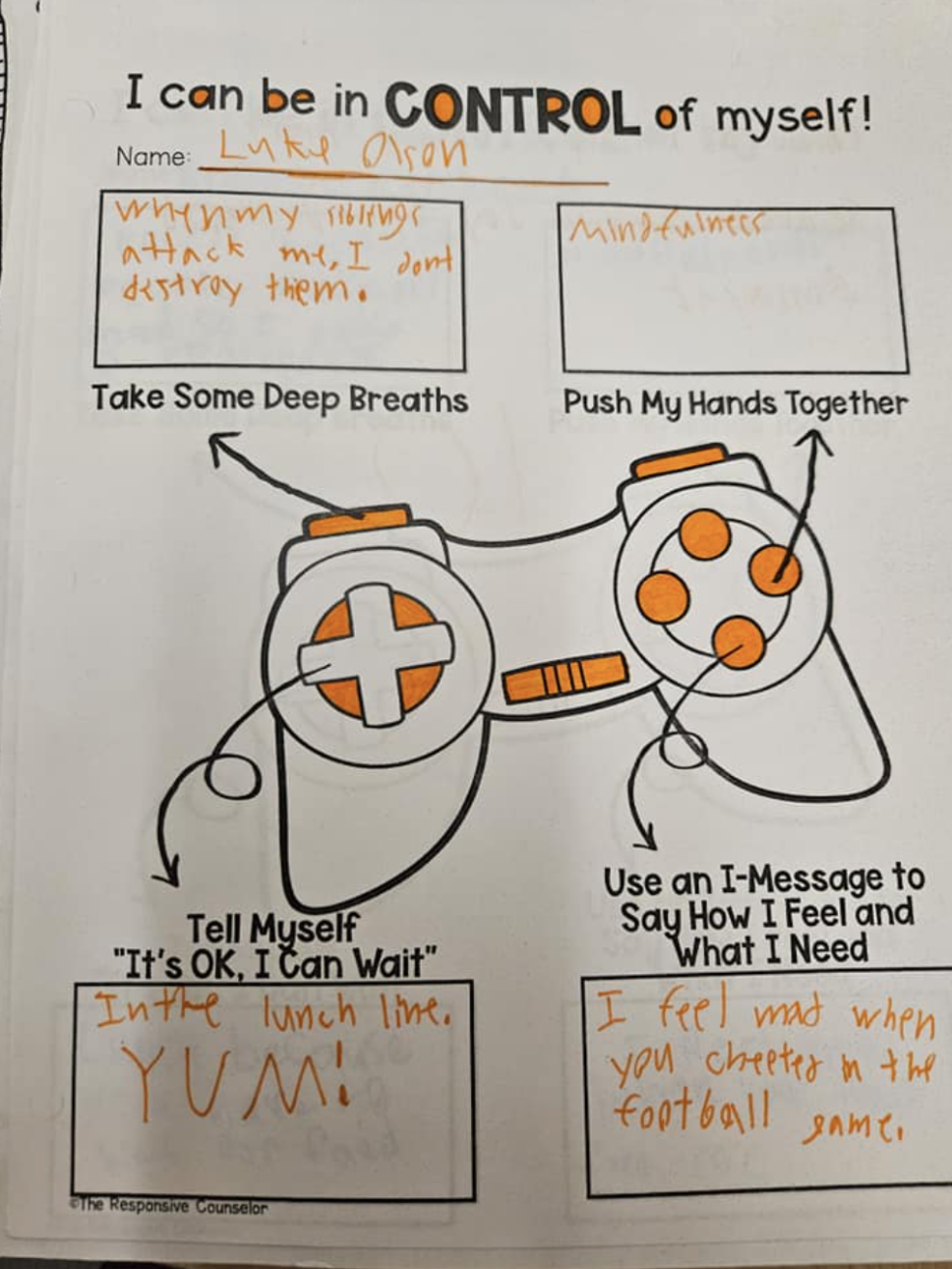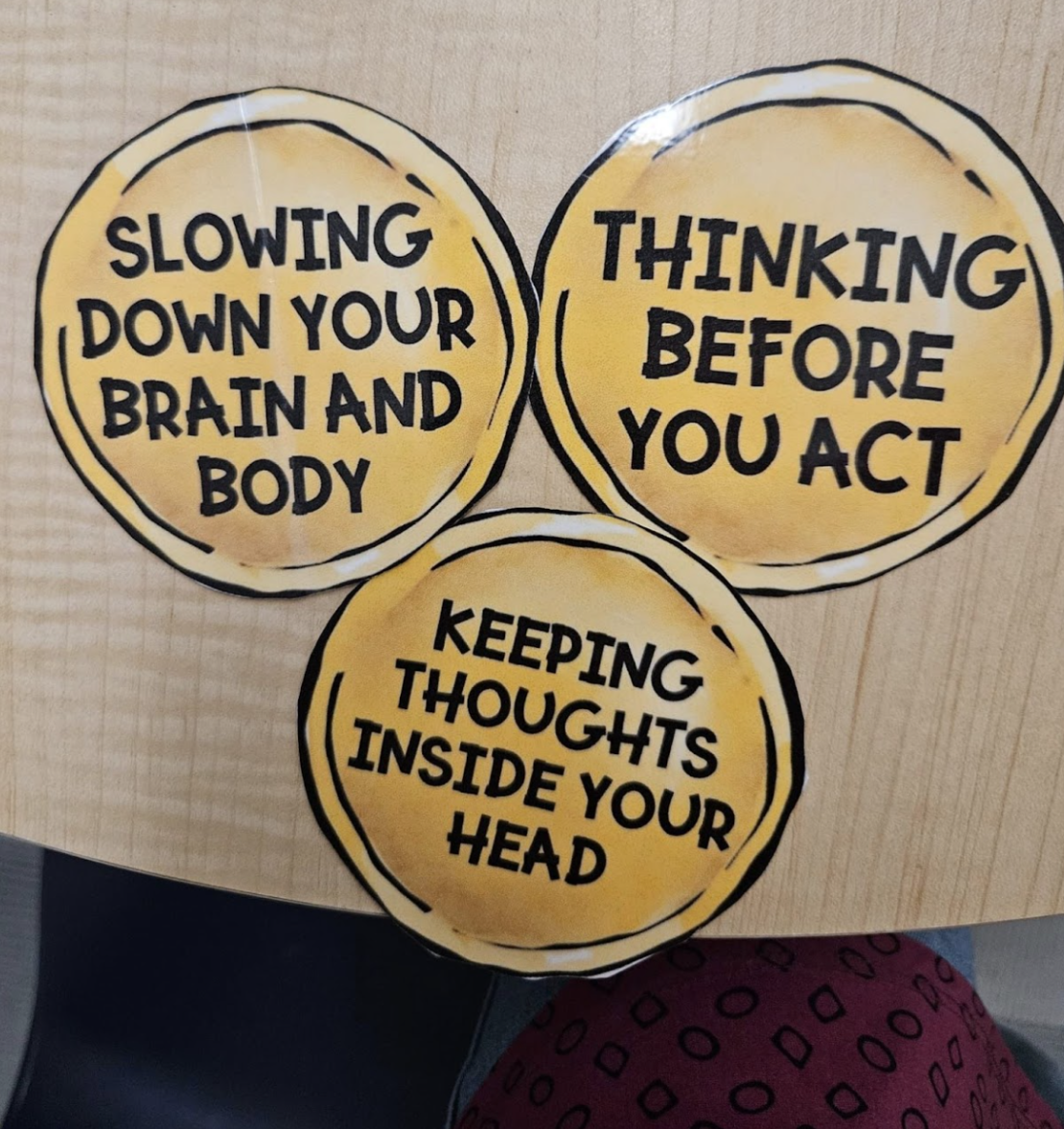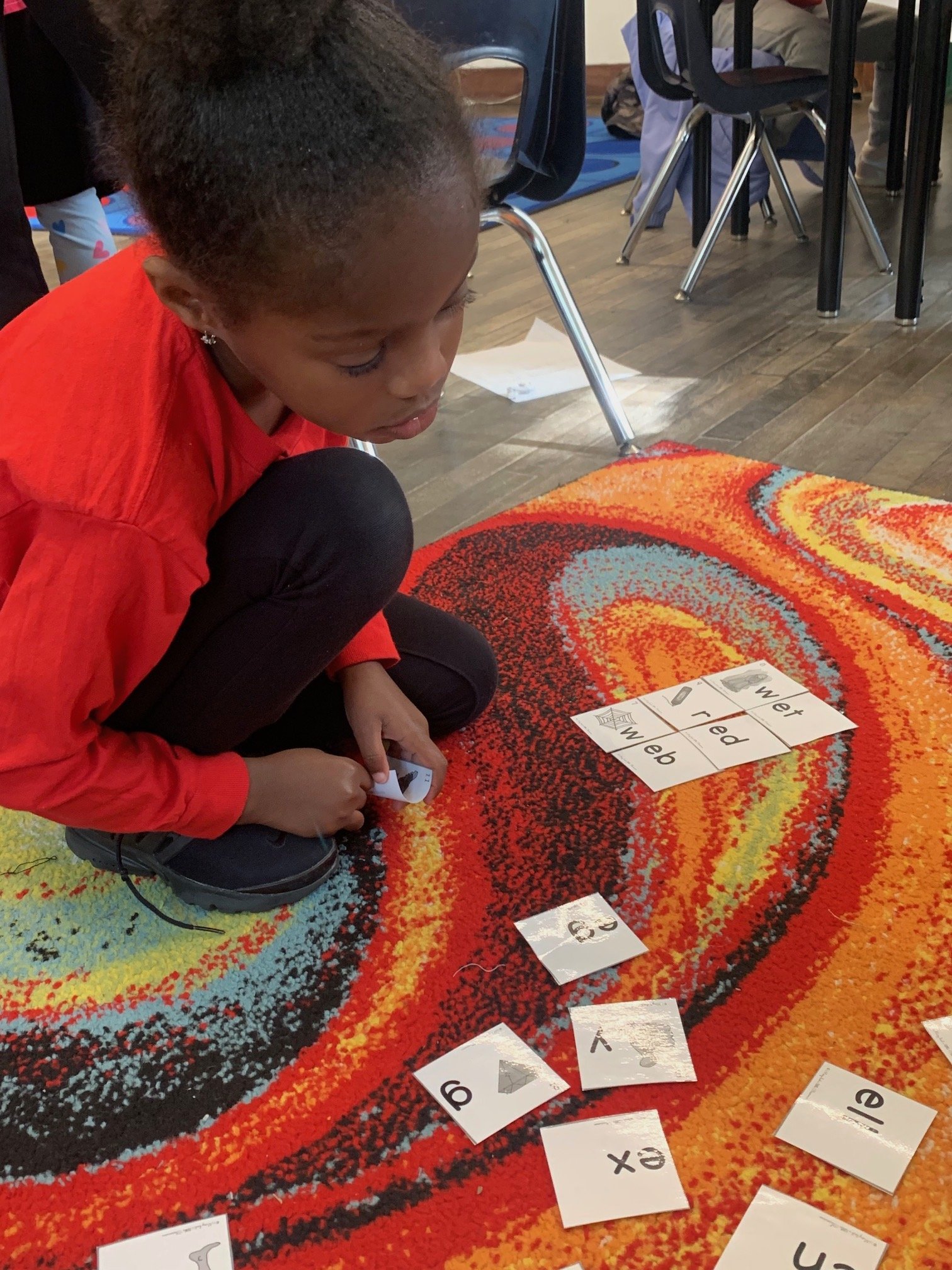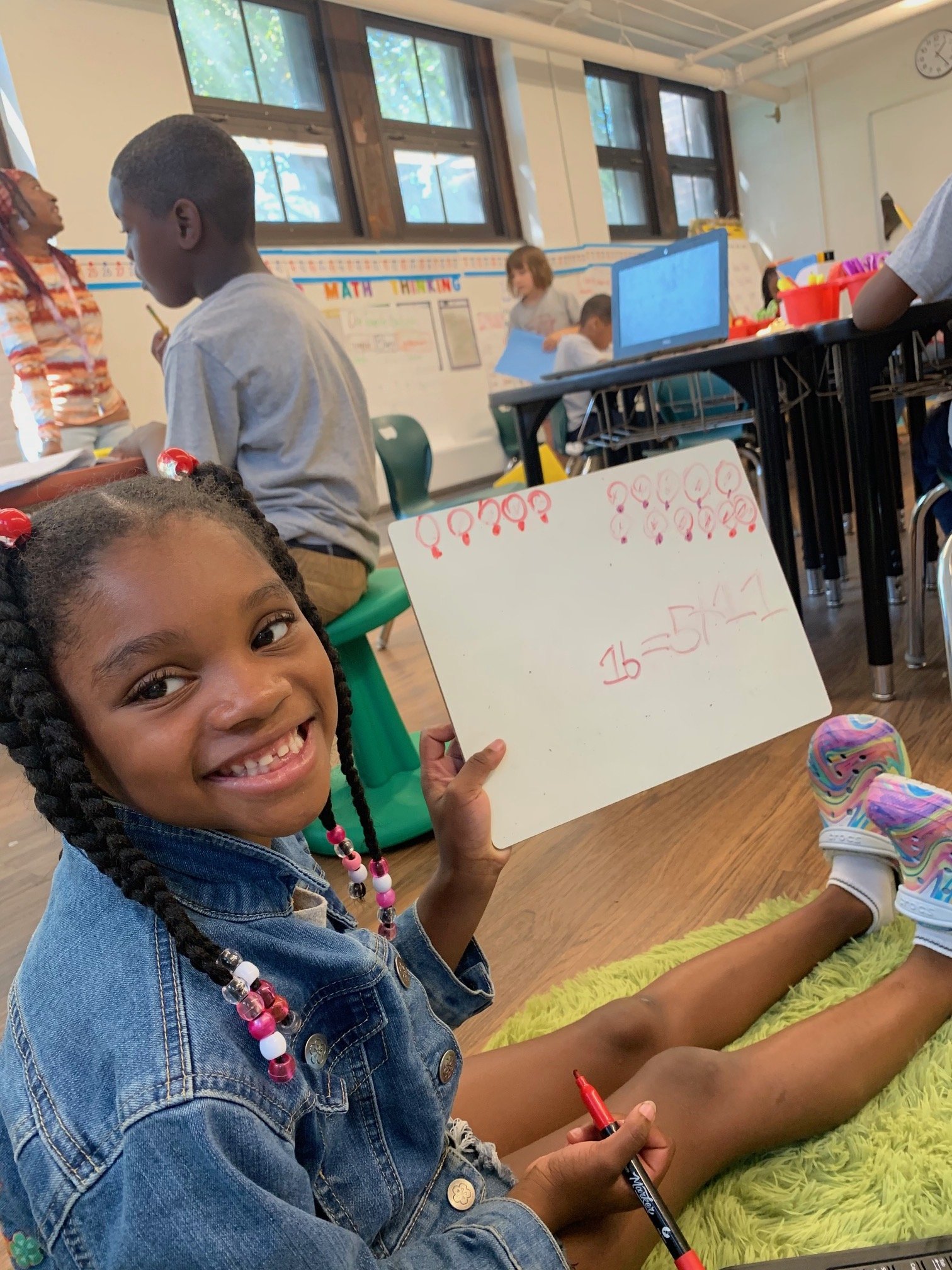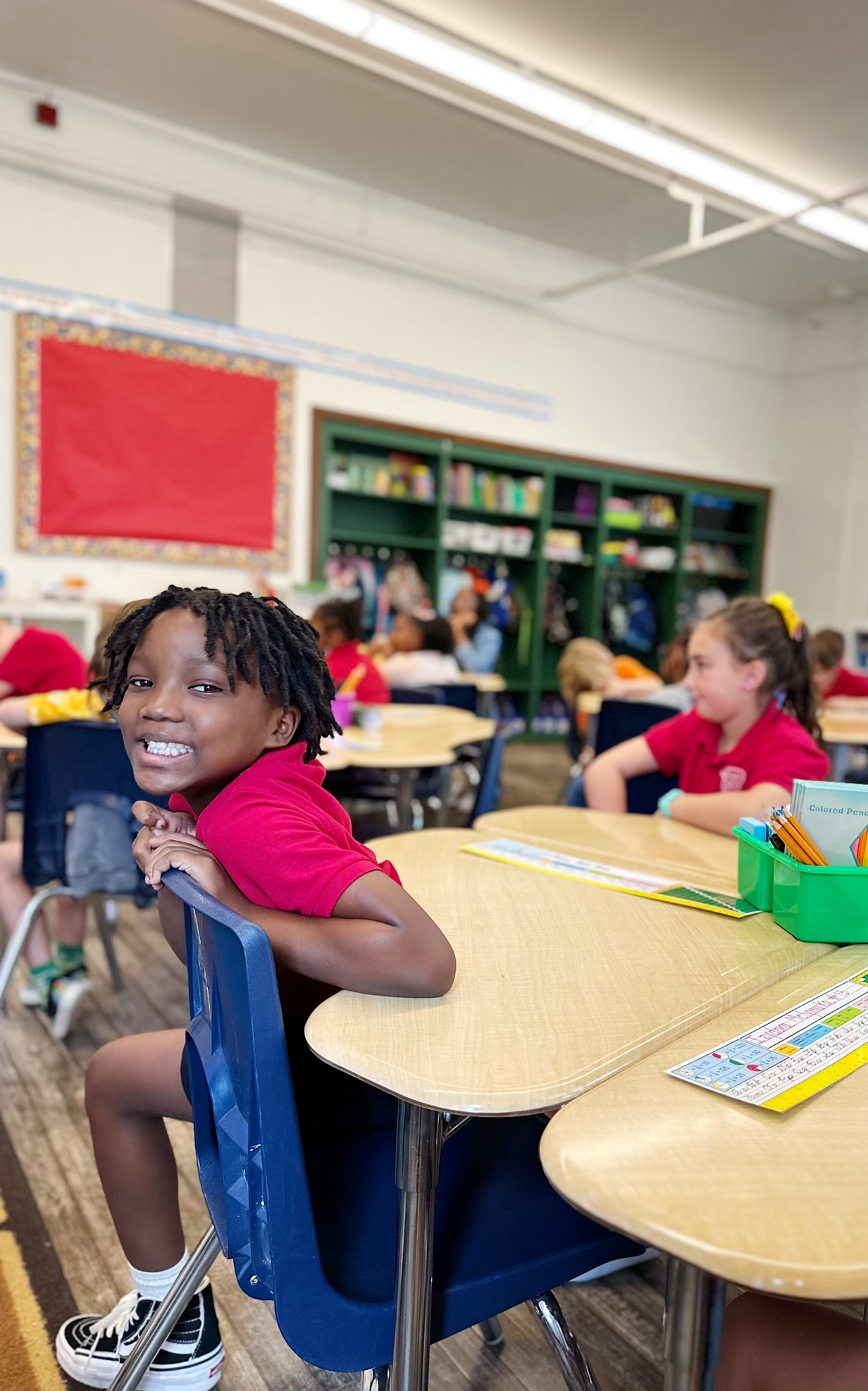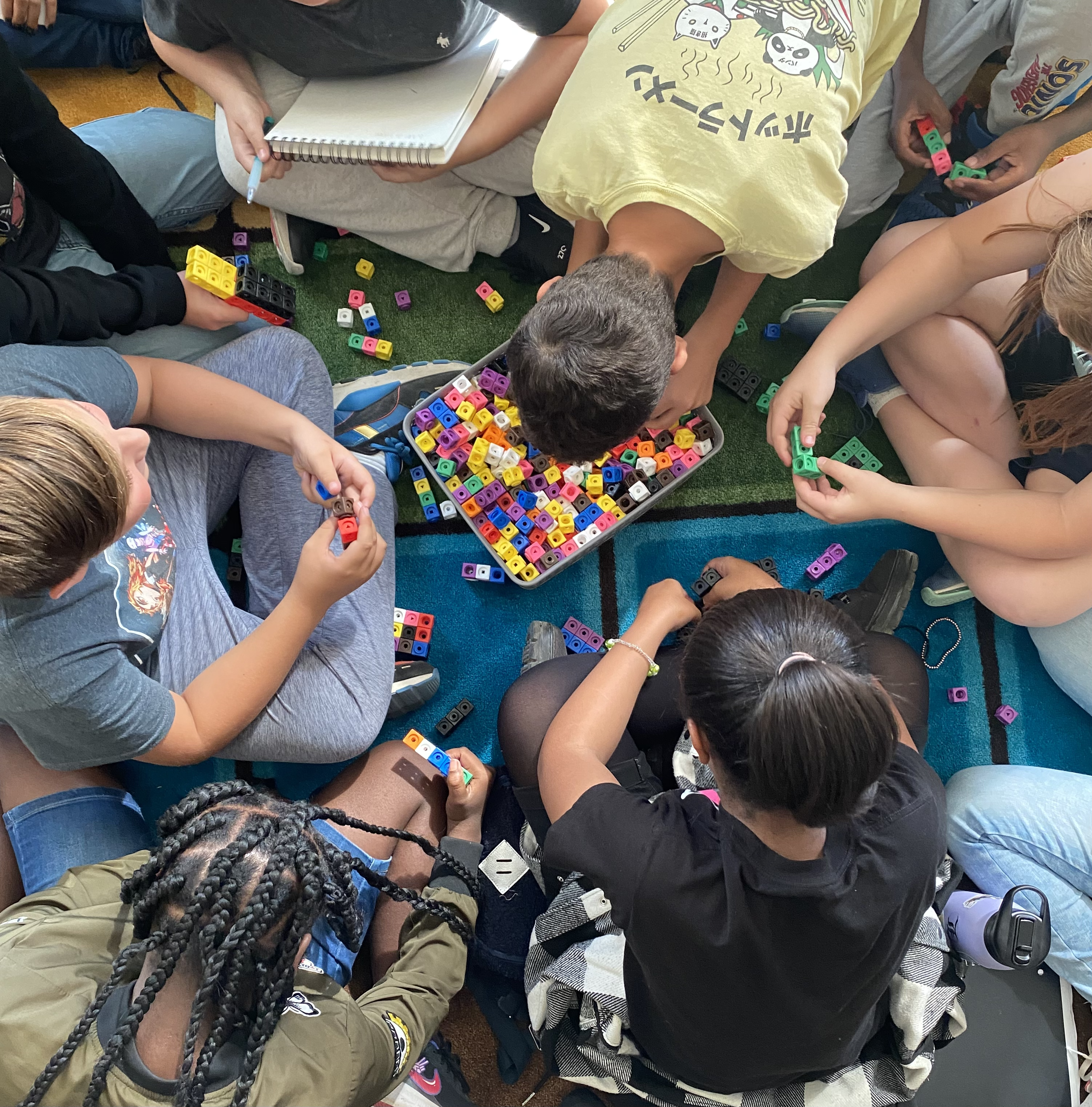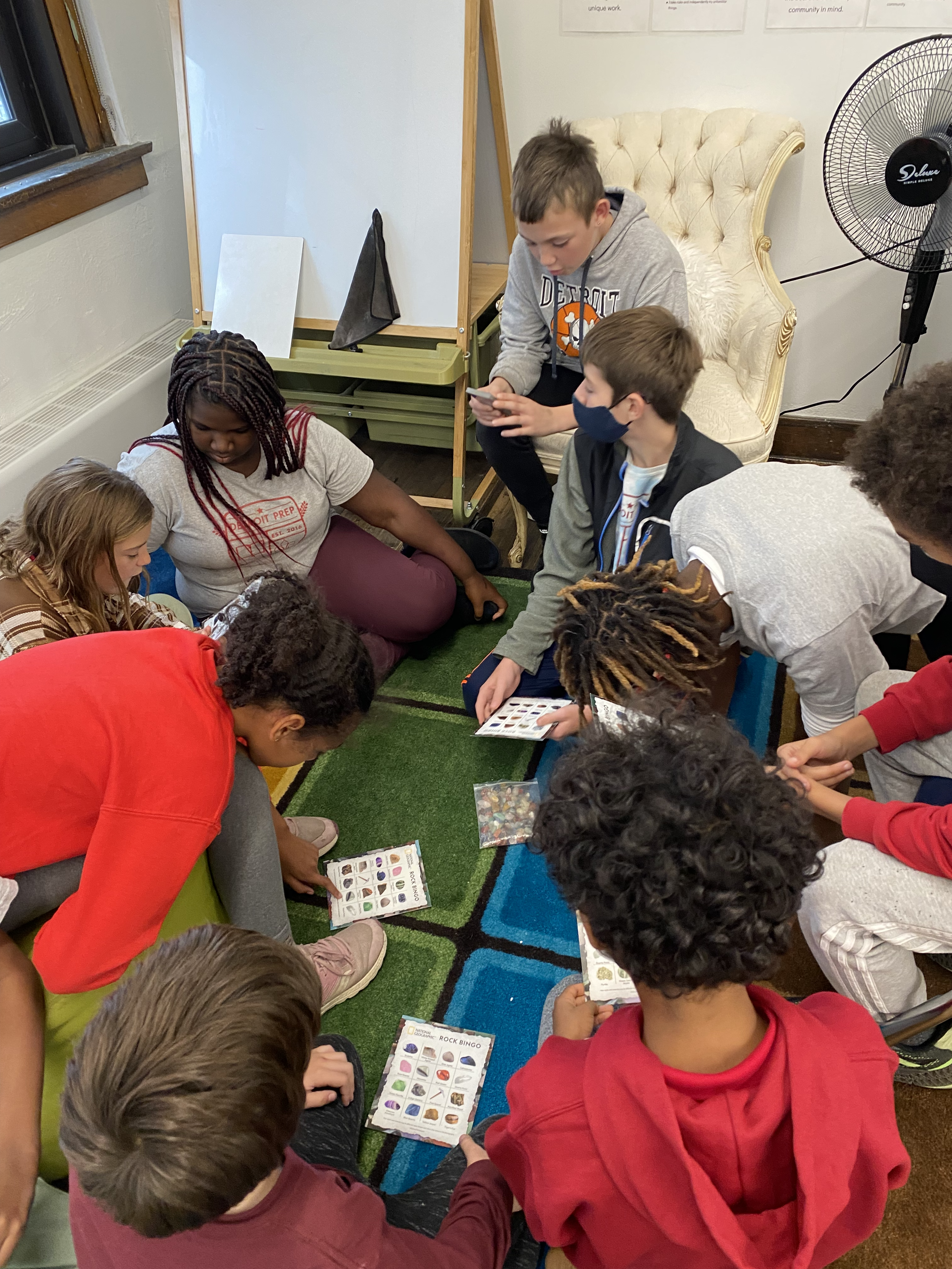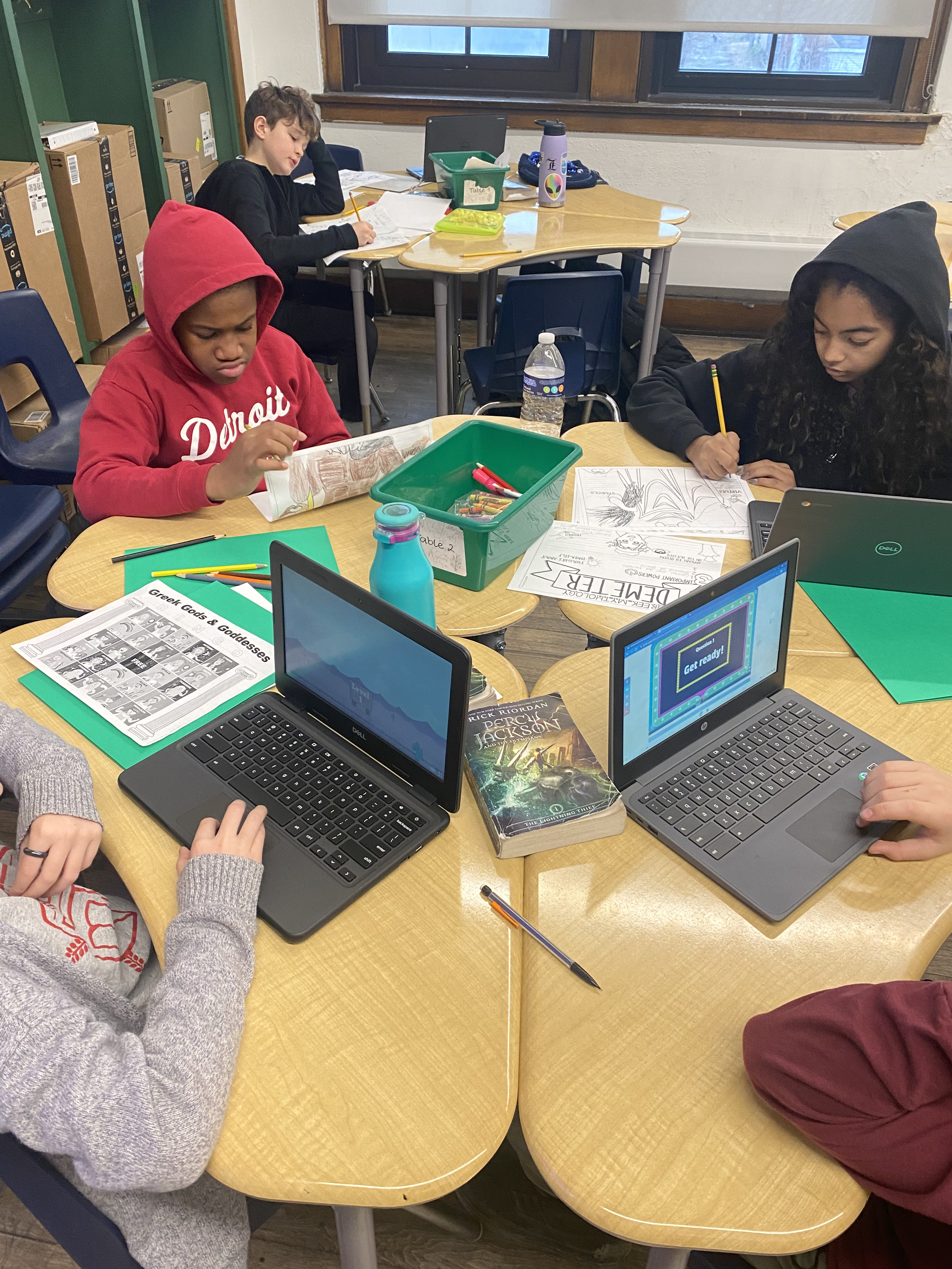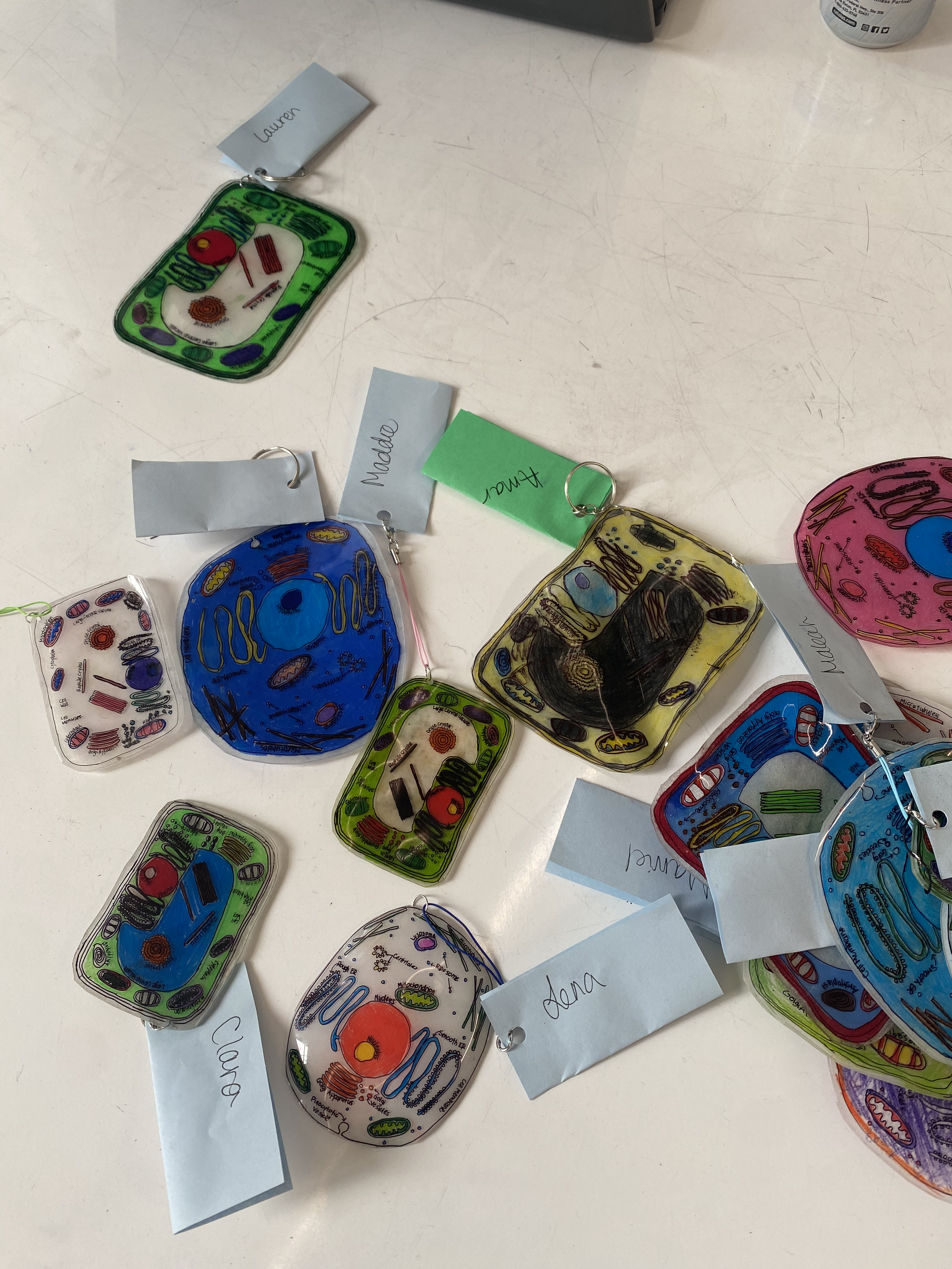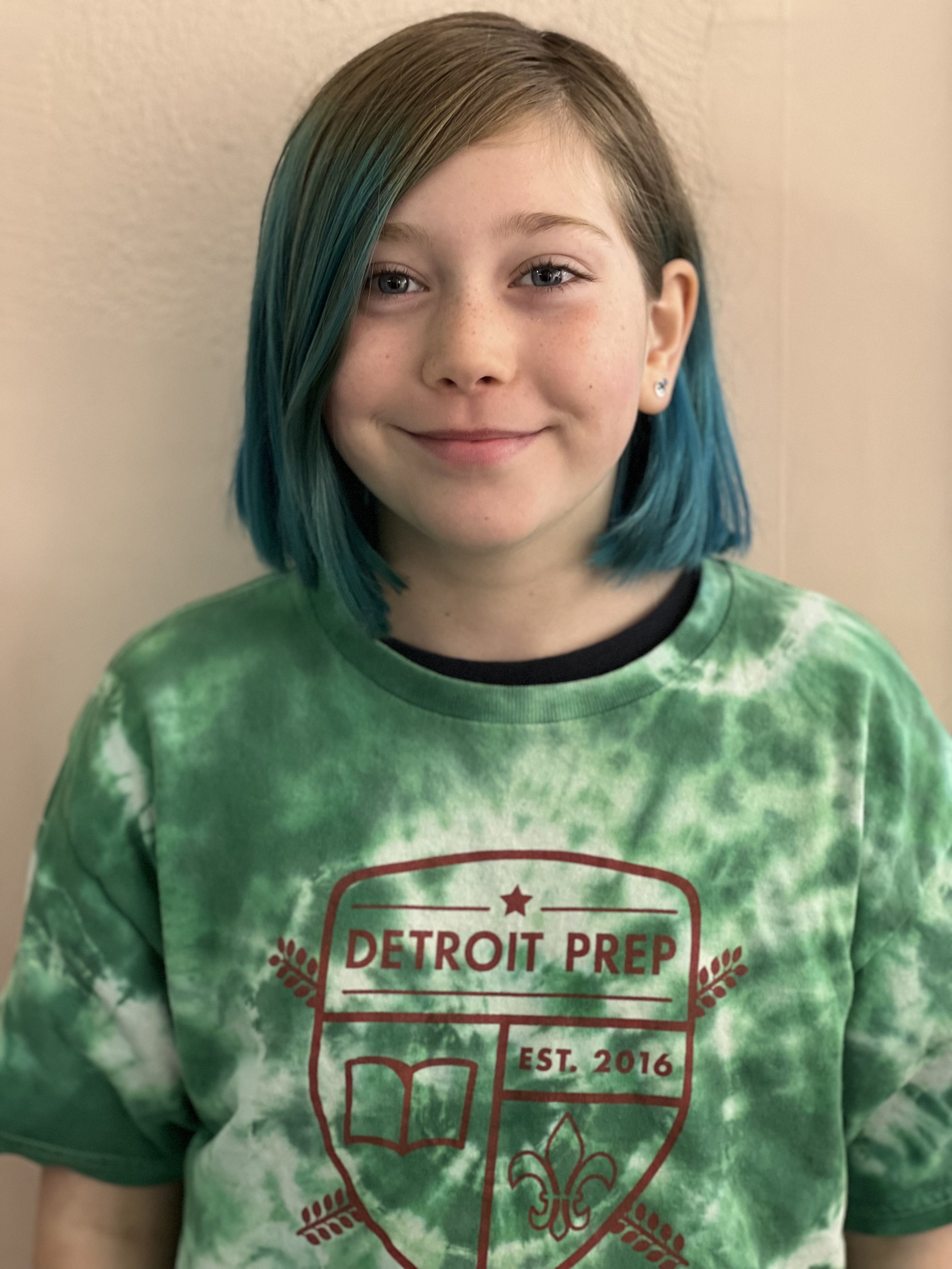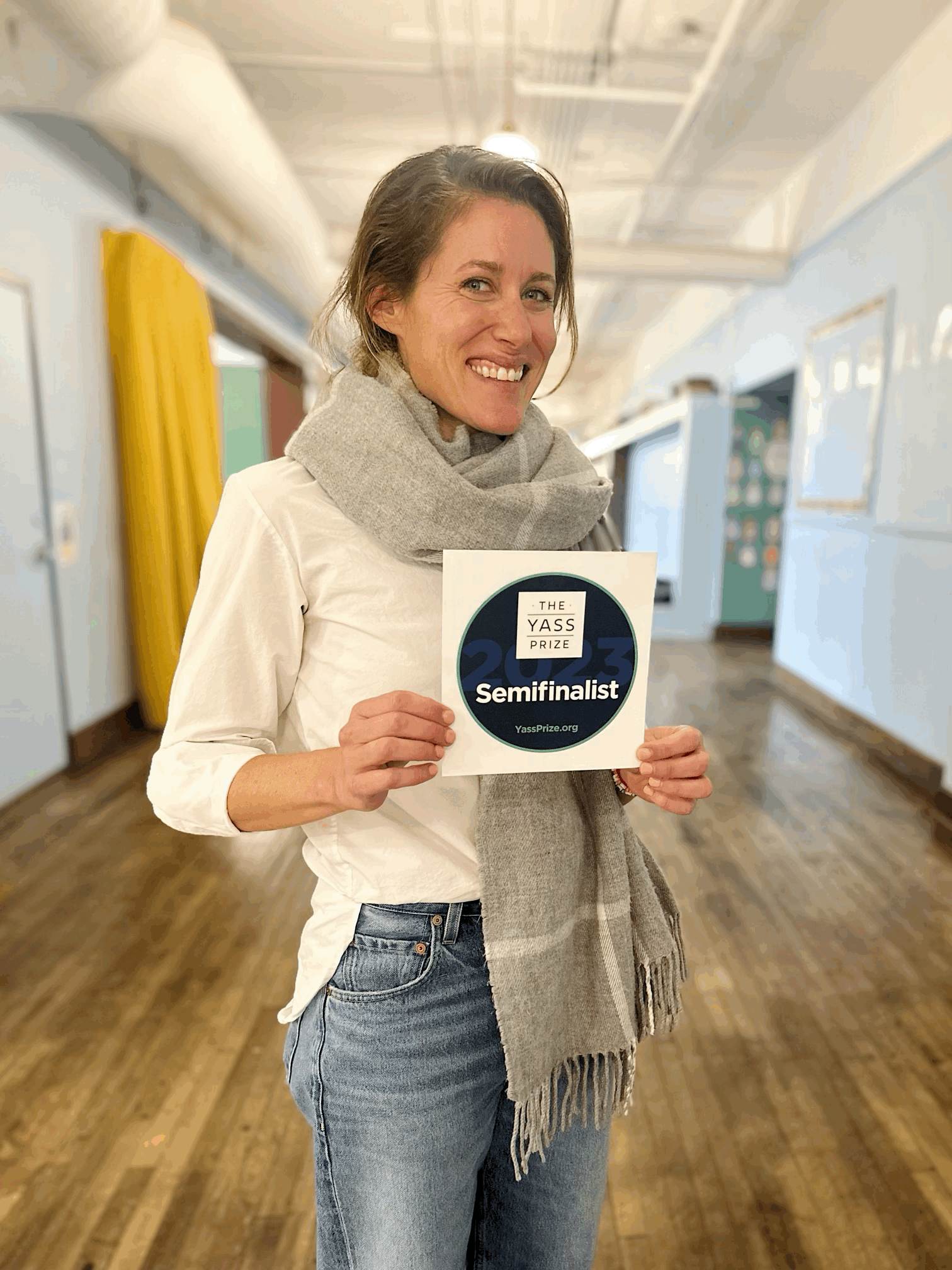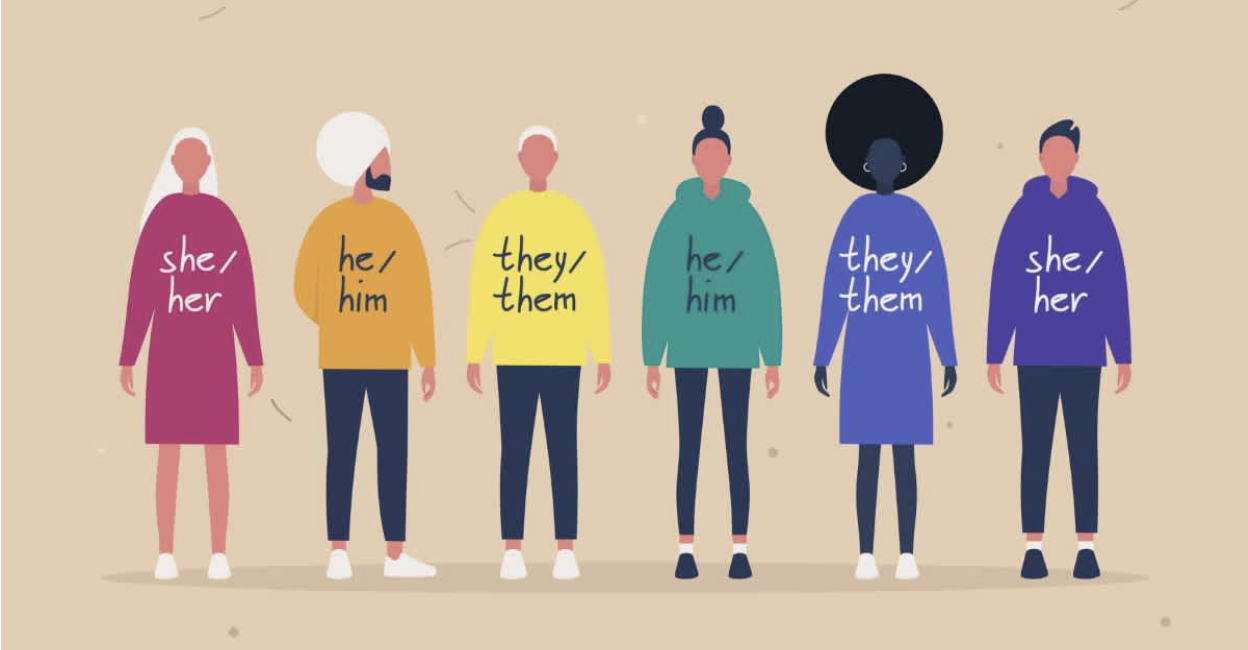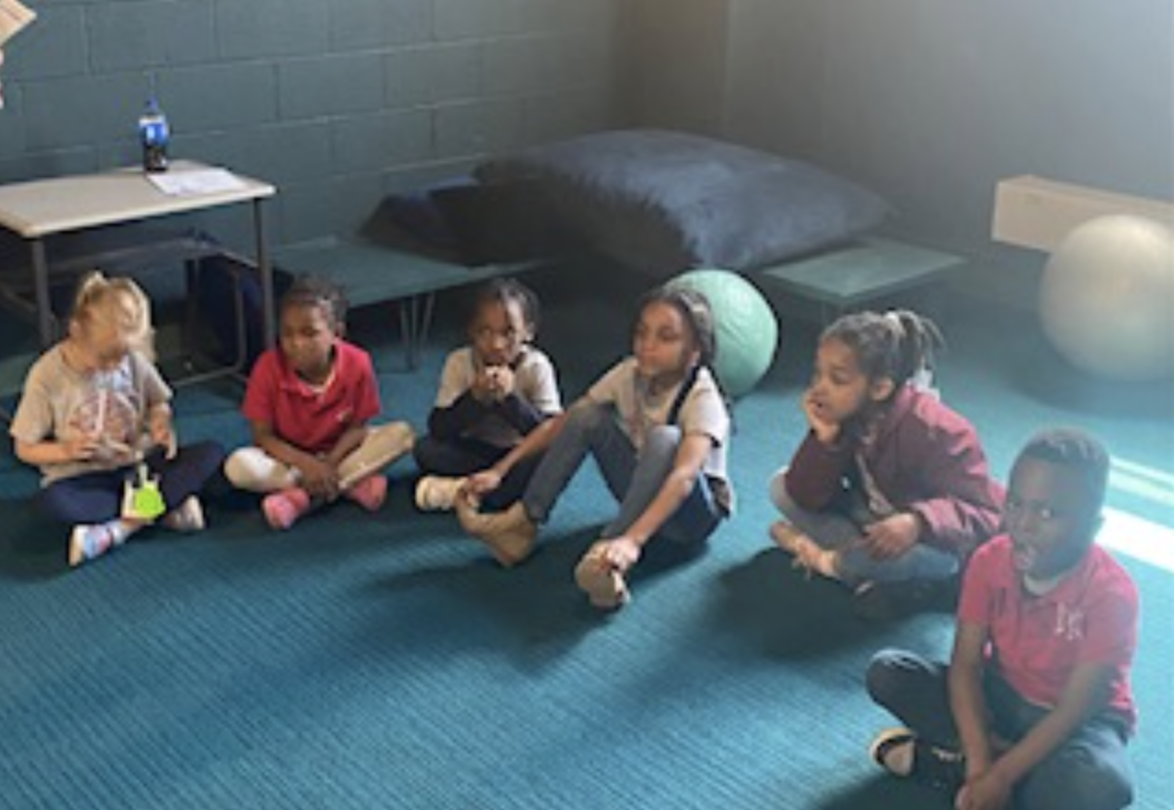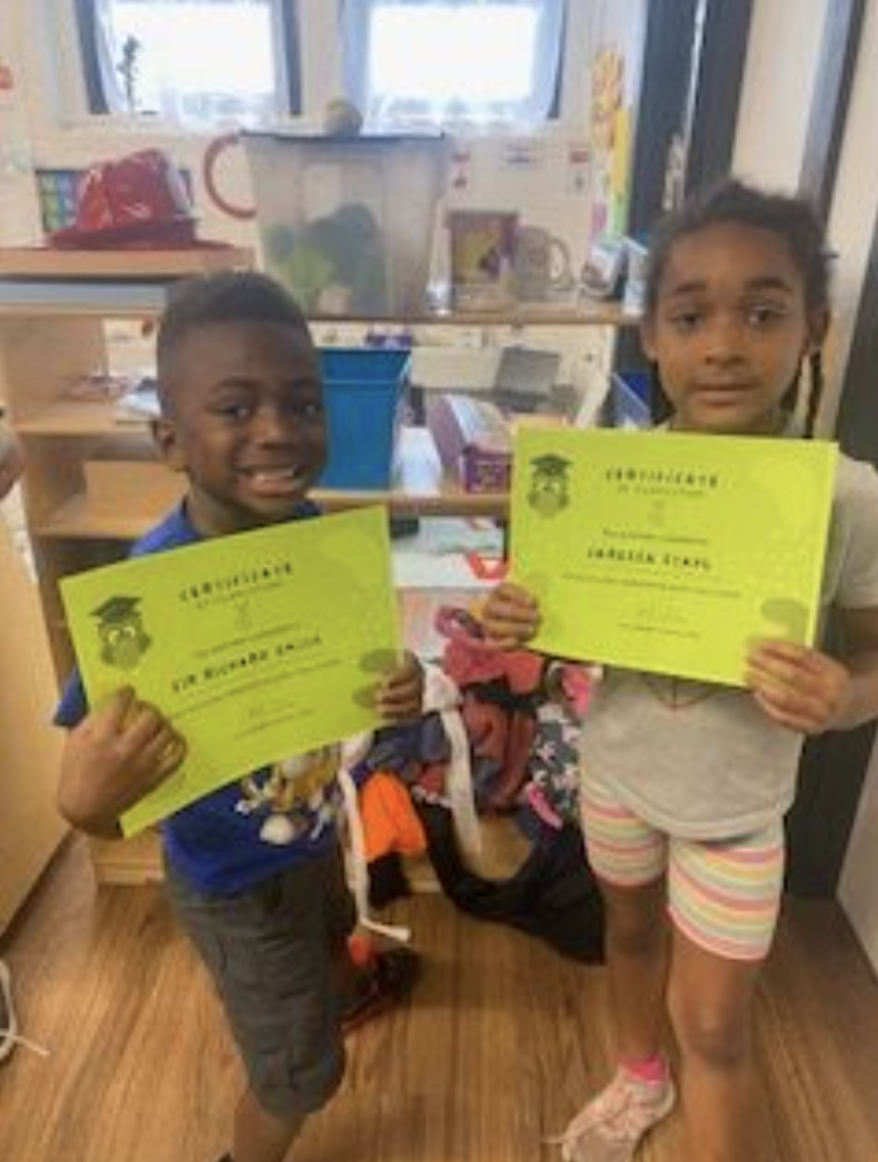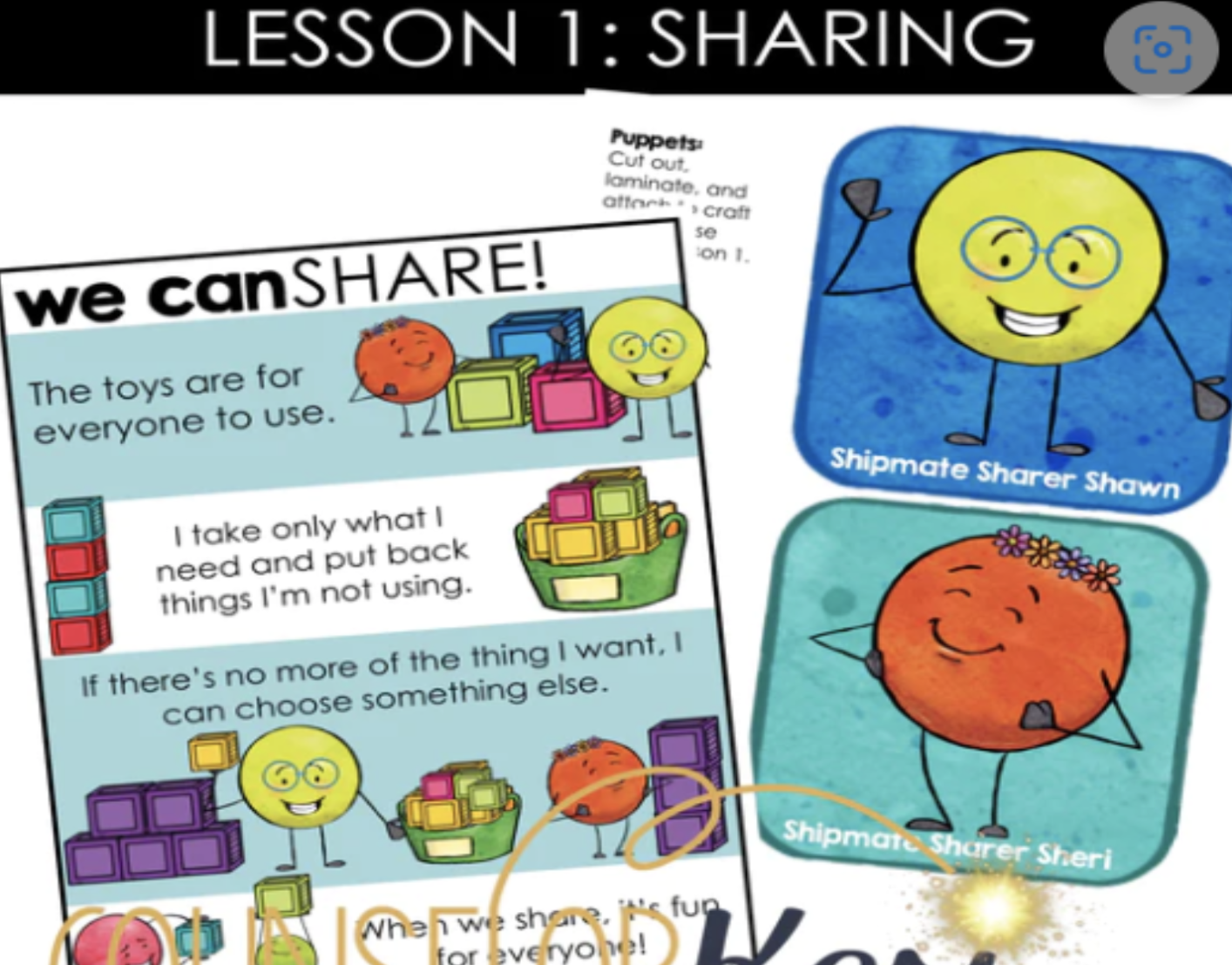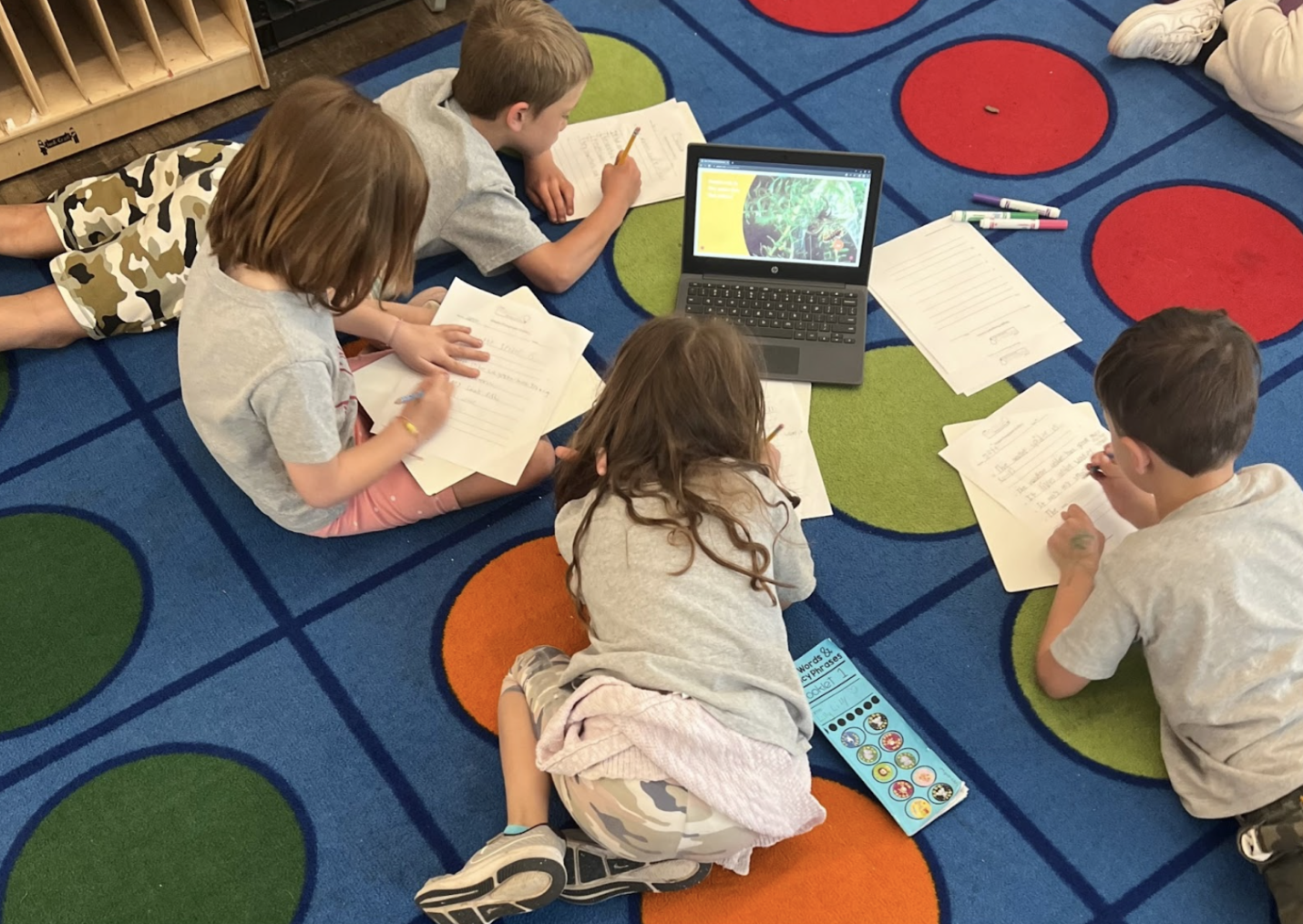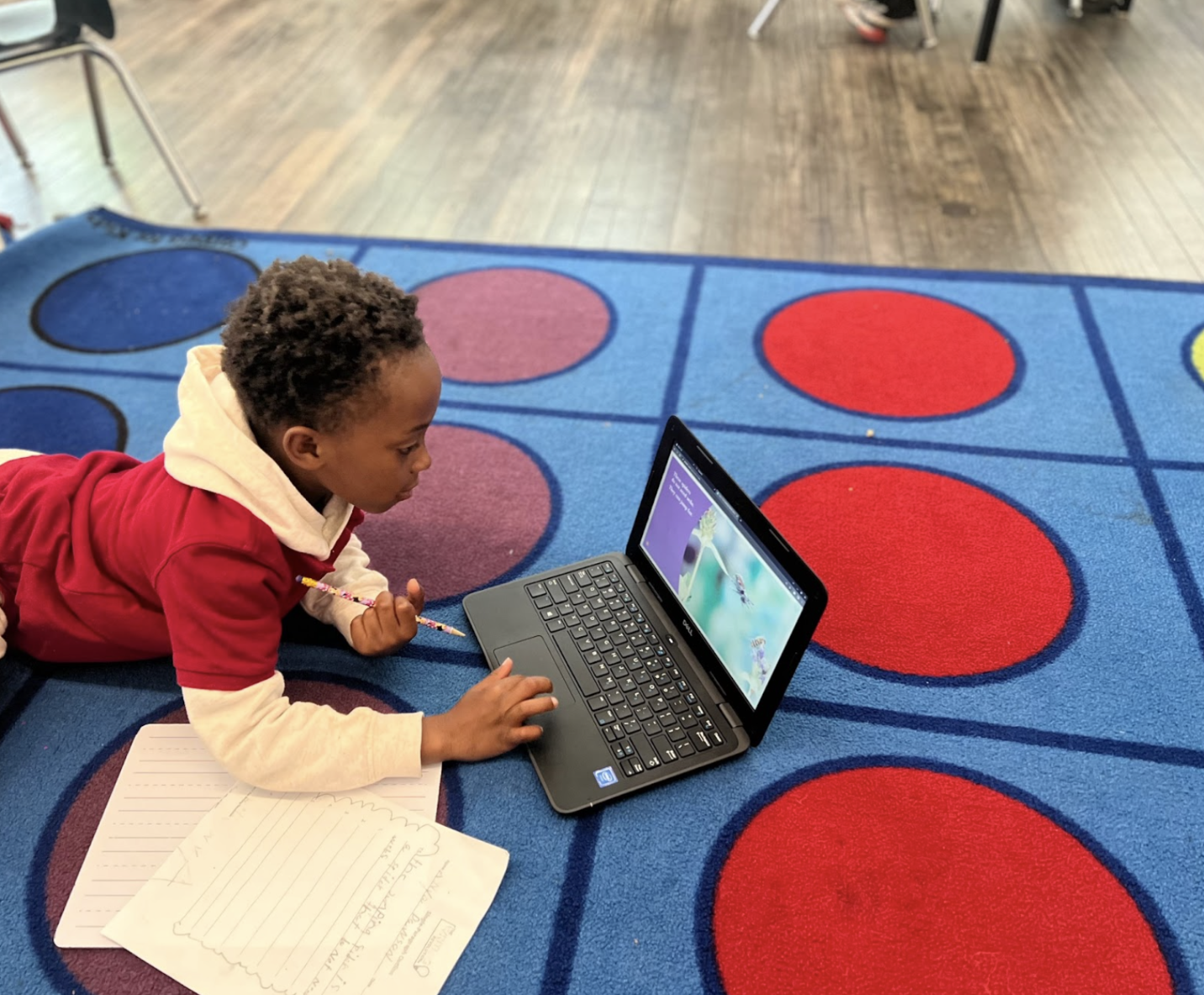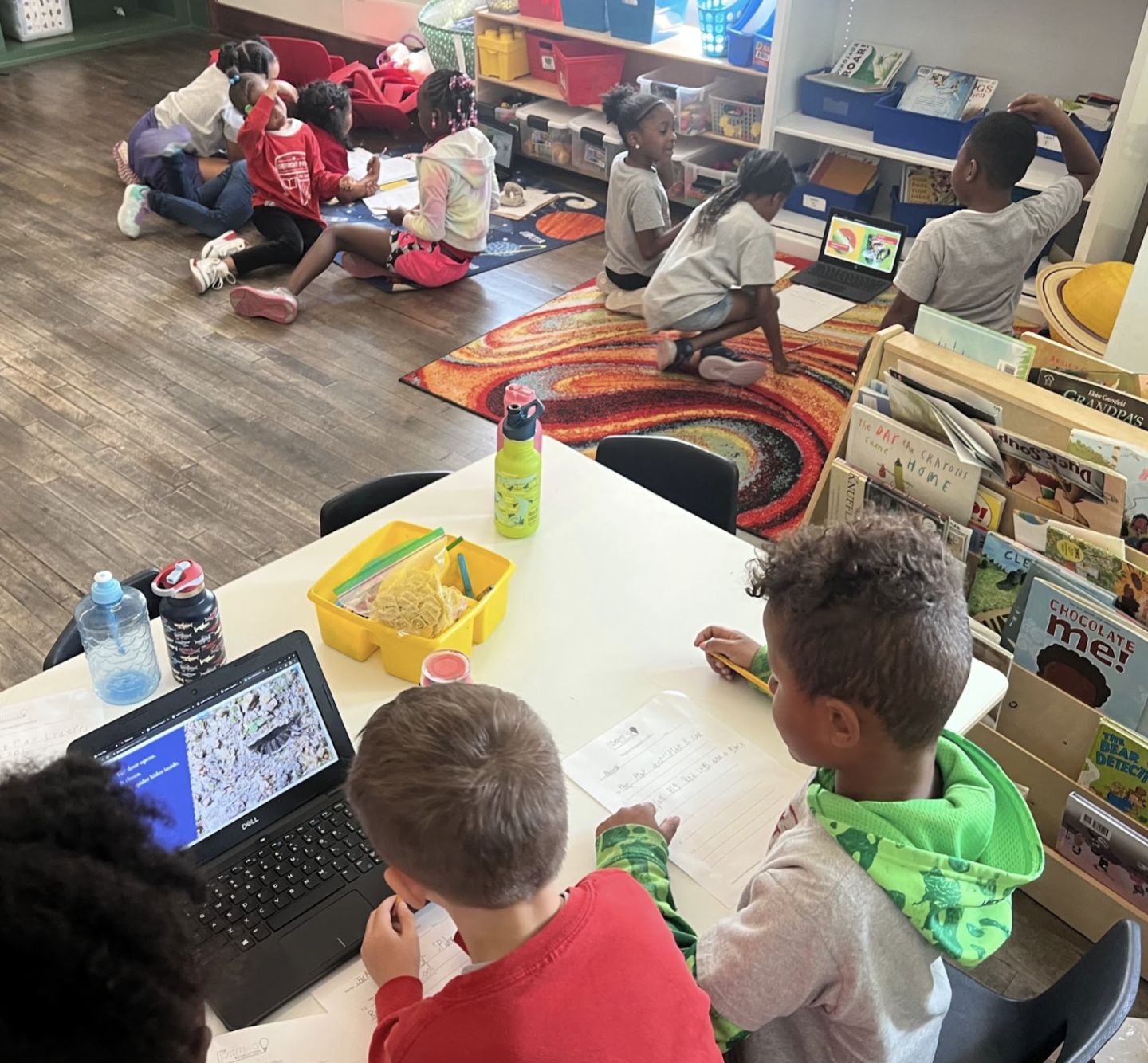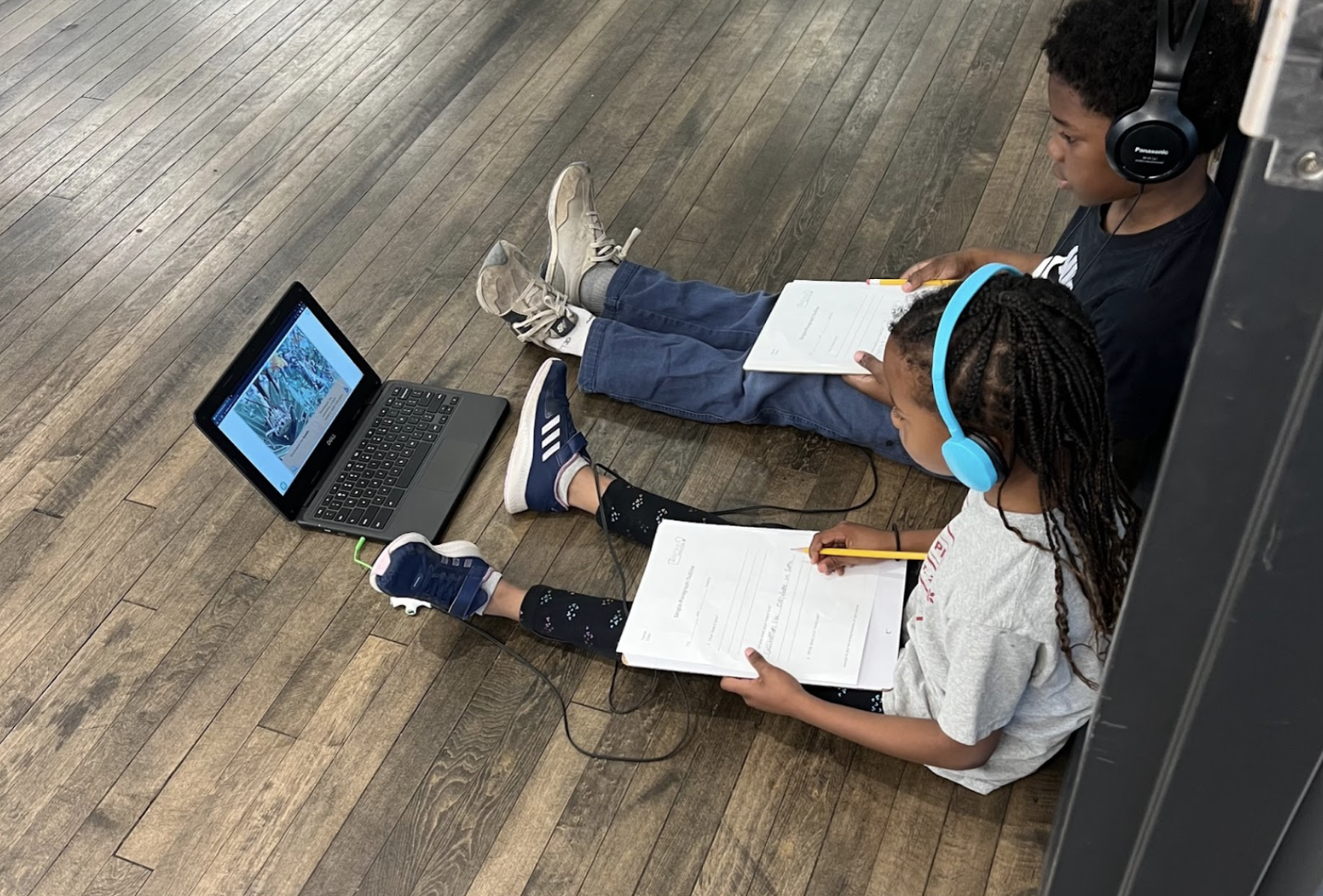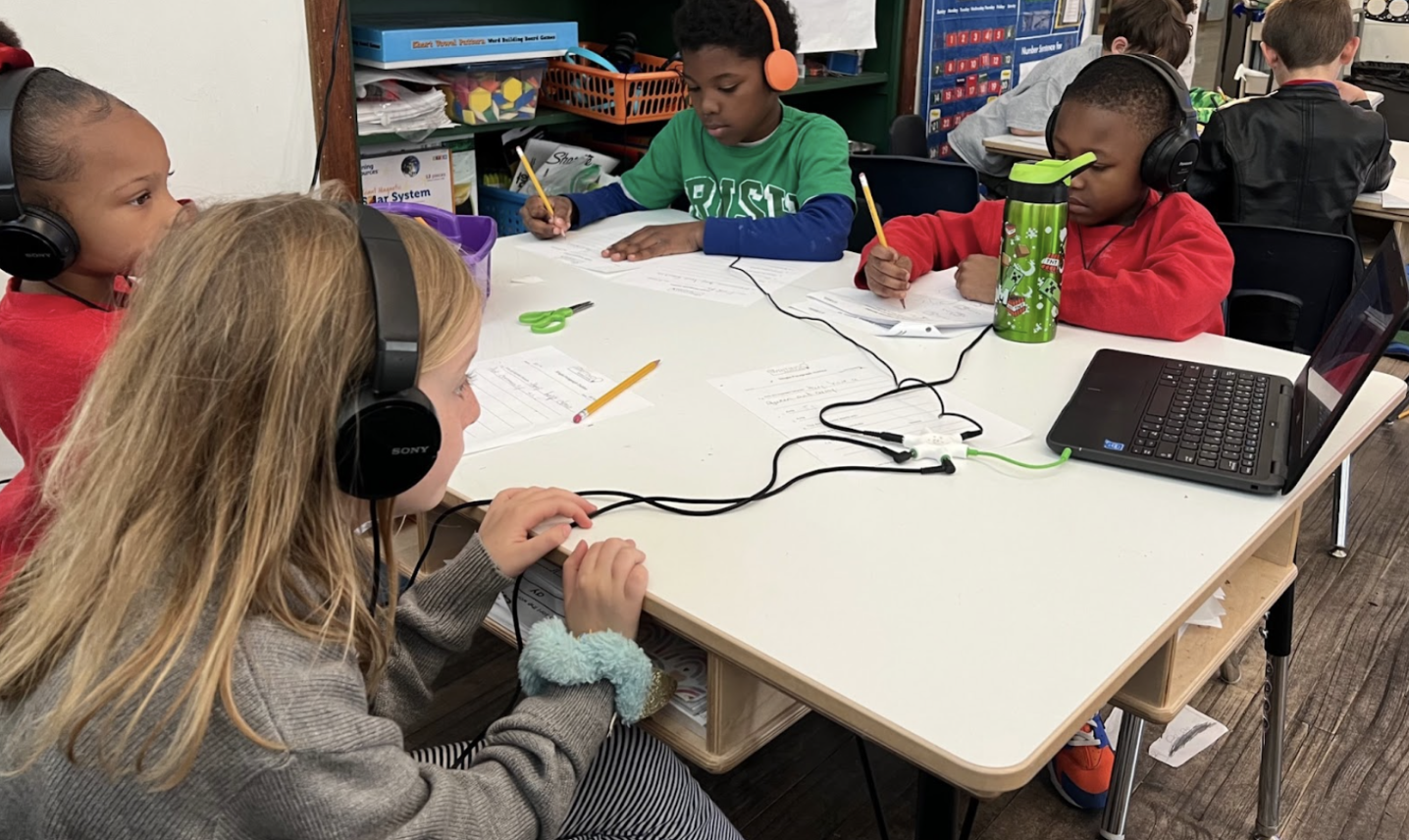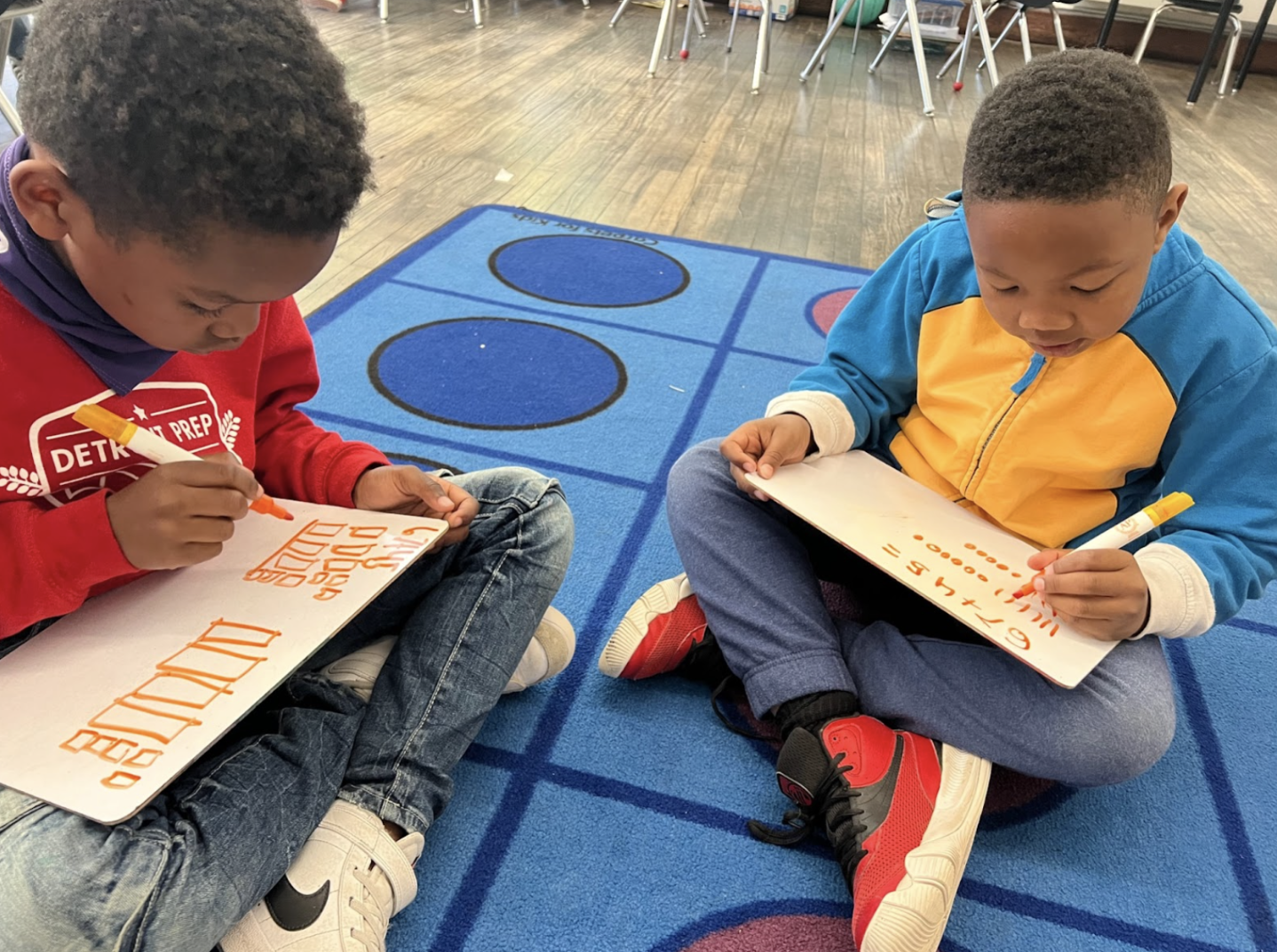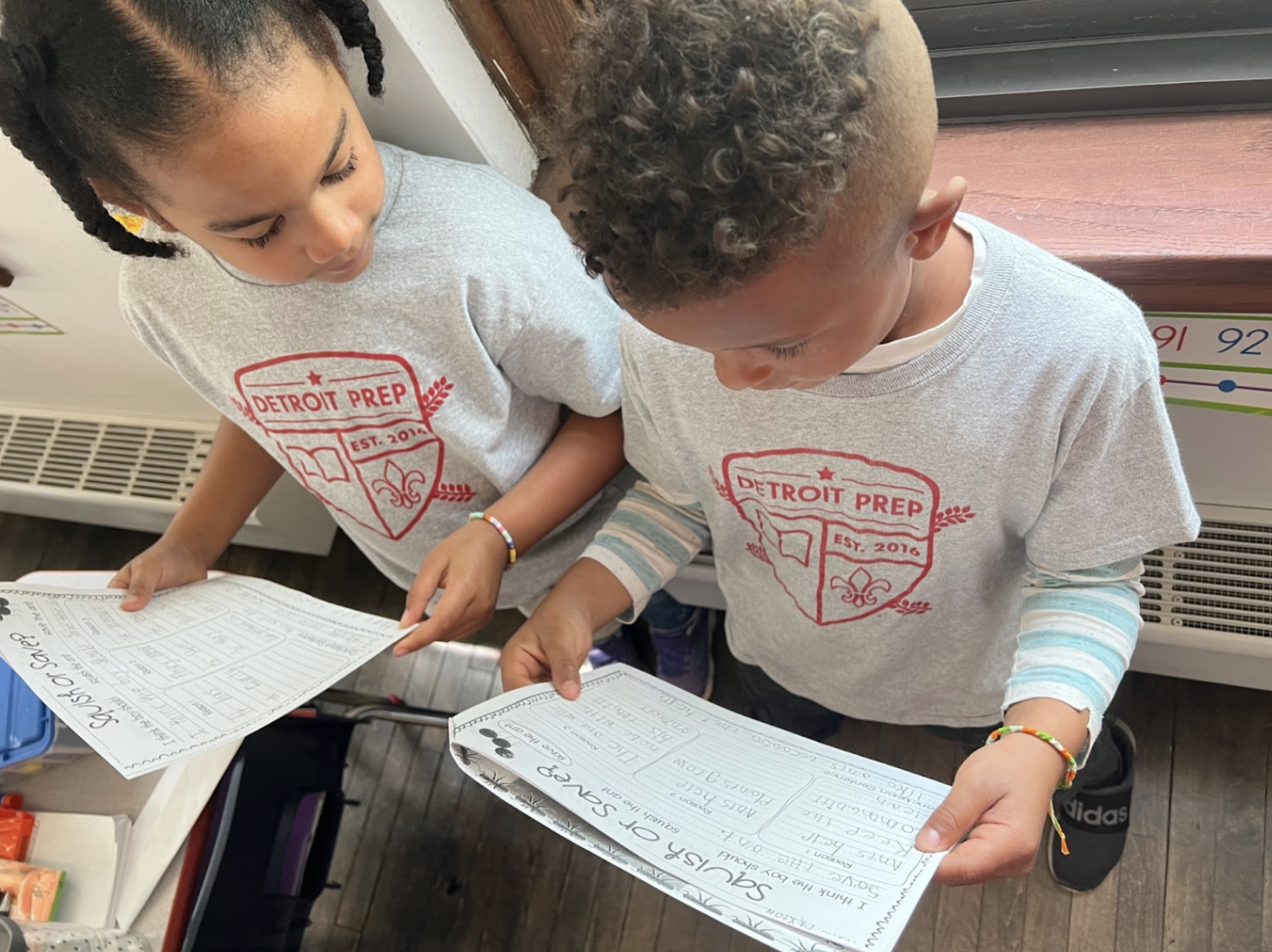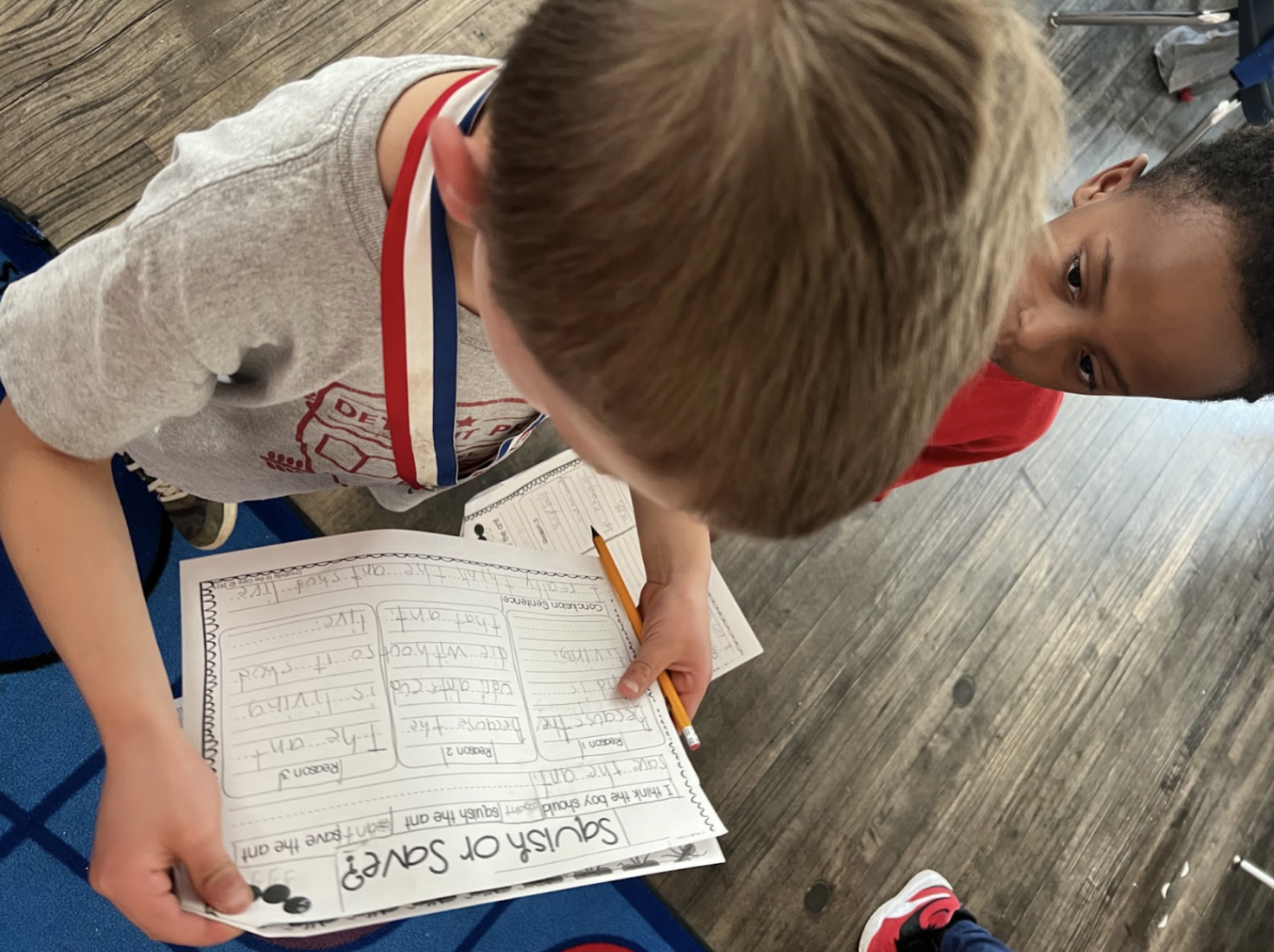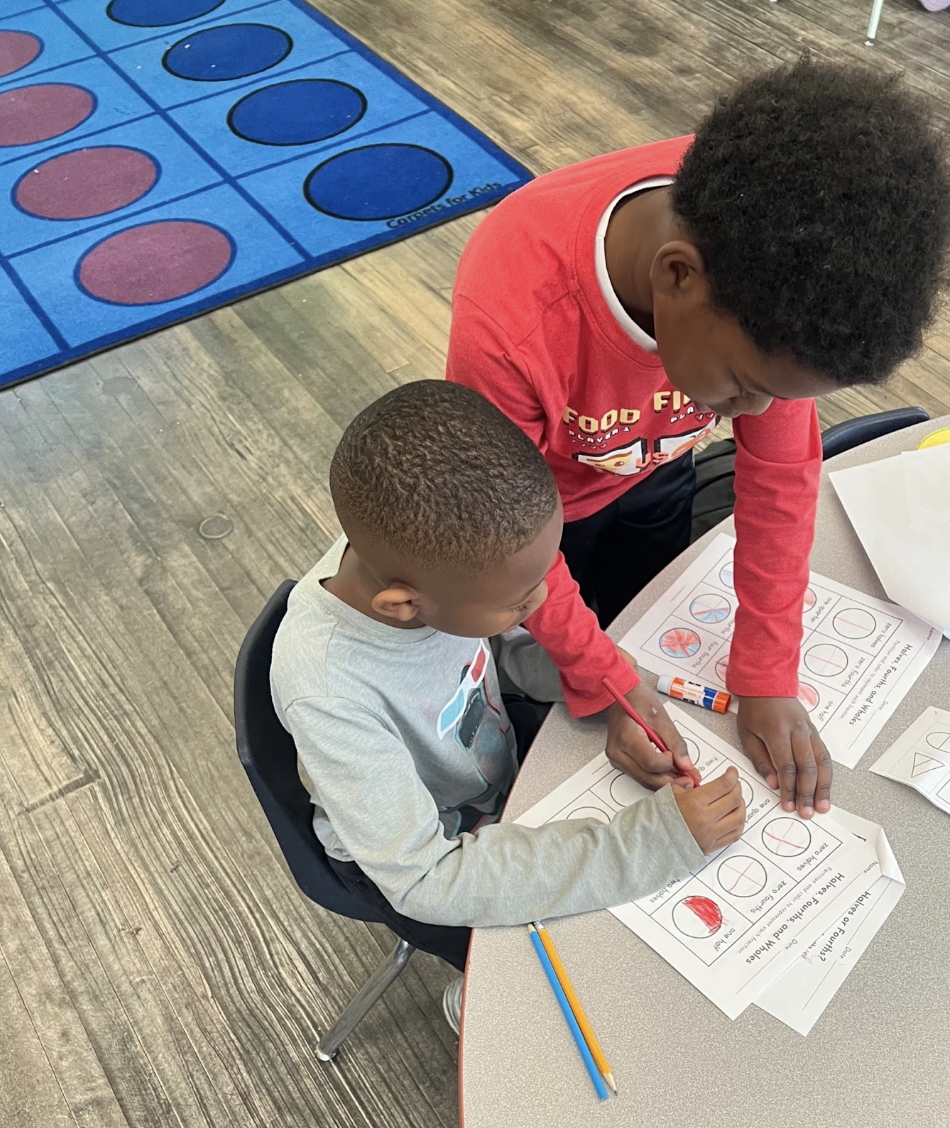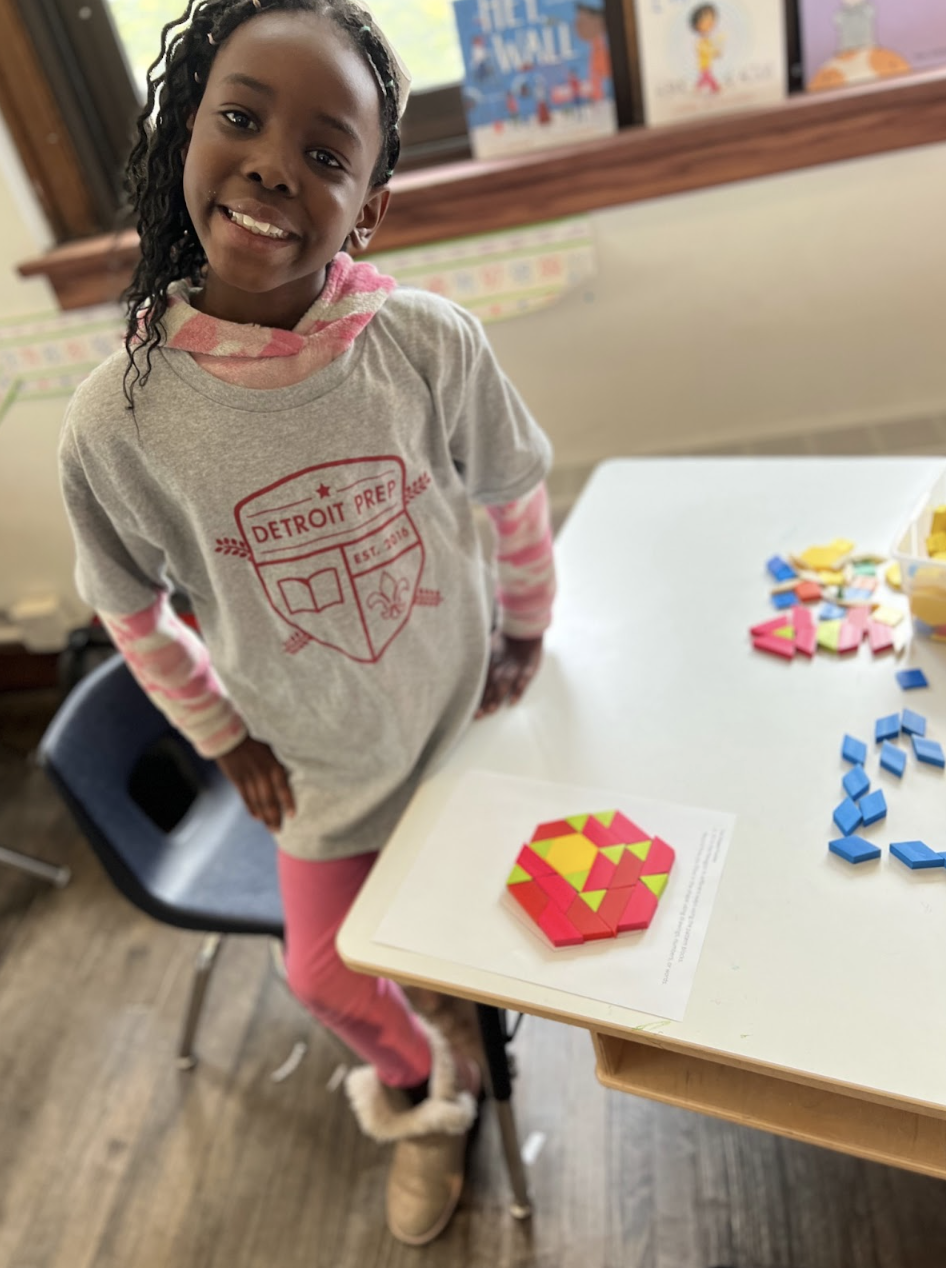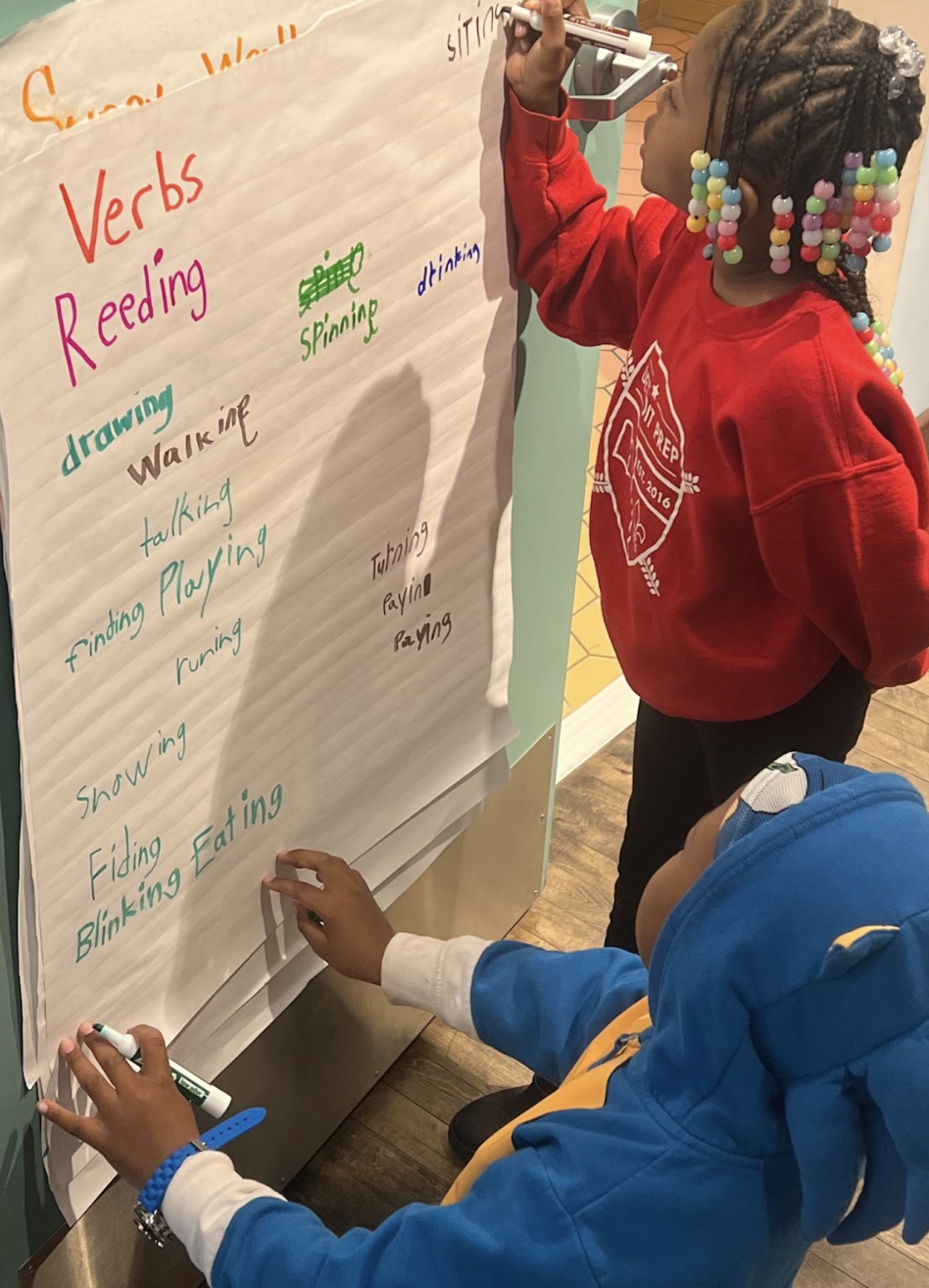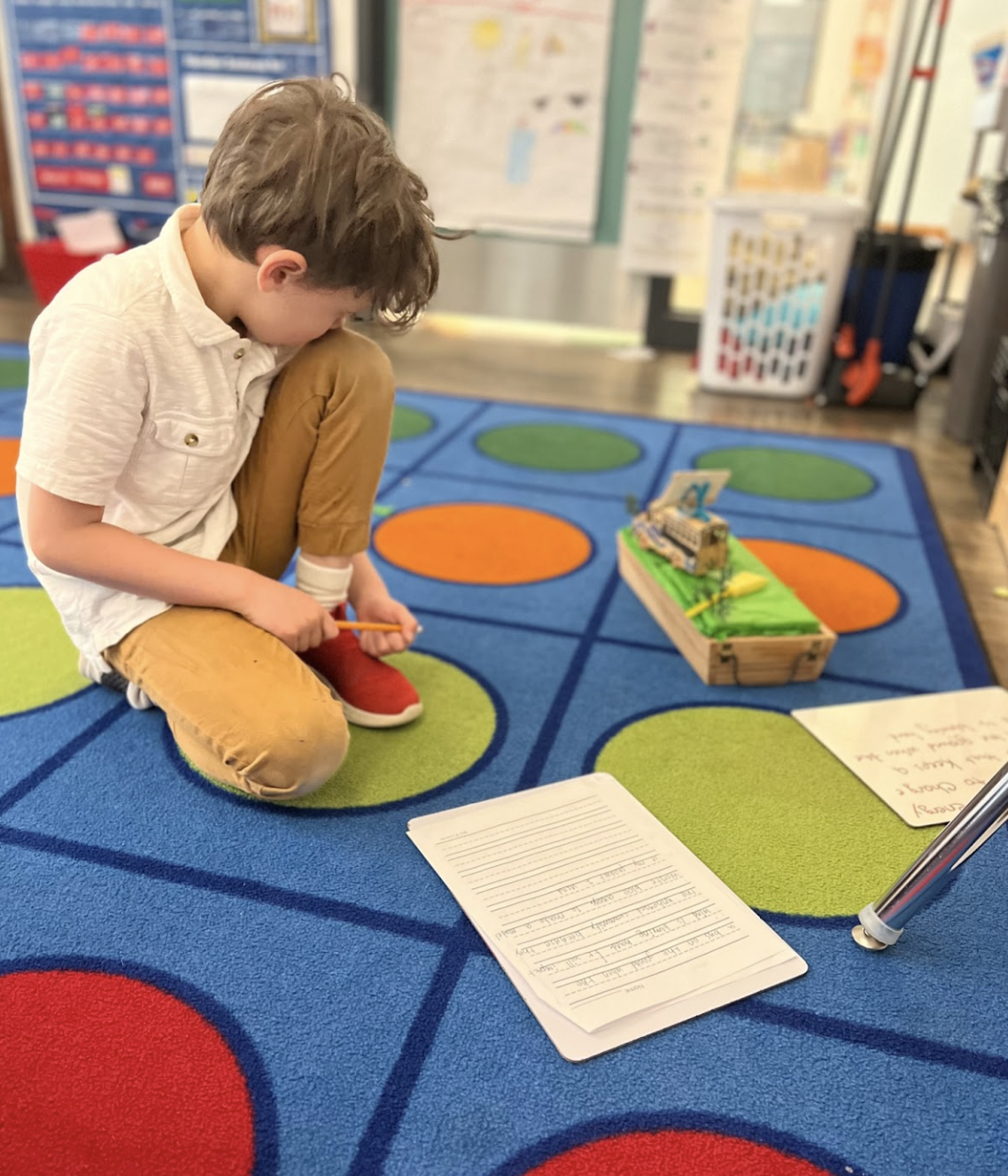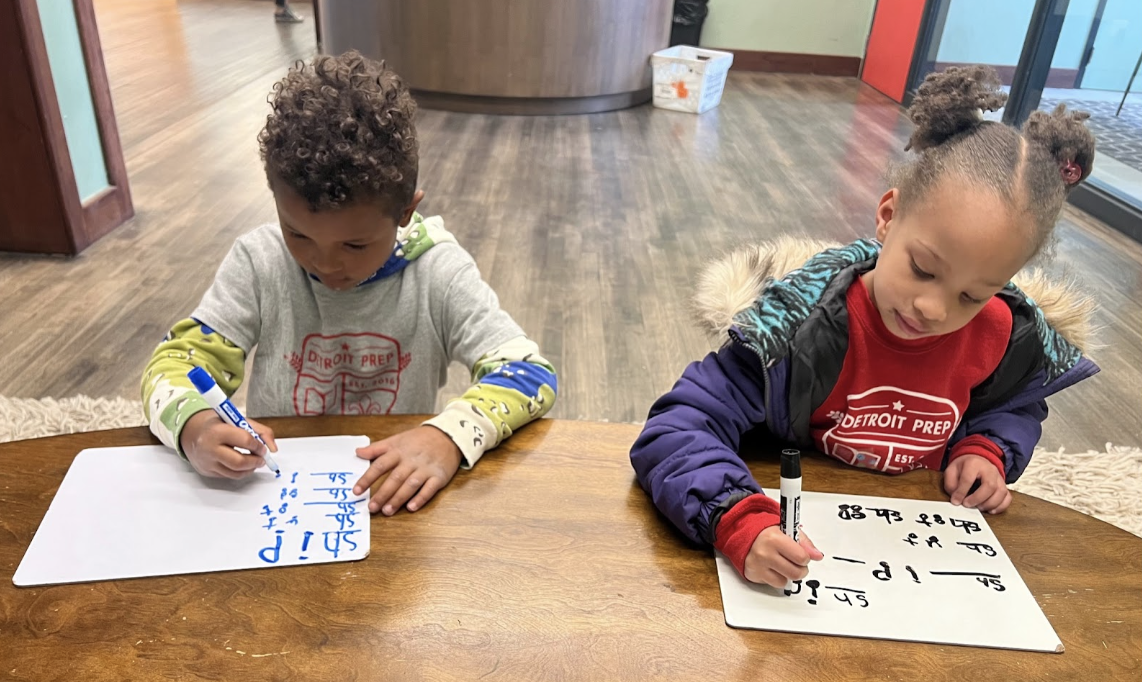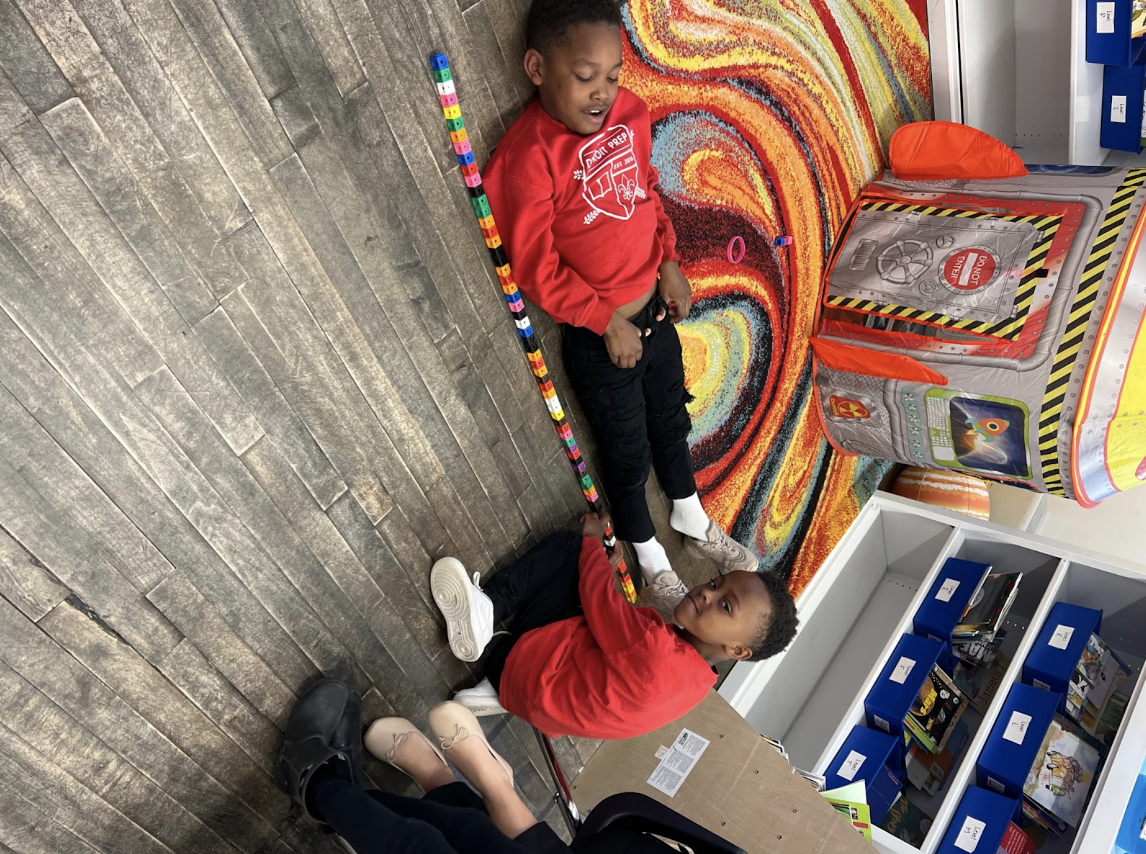Blog
5th & 6th Grade Expedition Expert: Marie Kamido
Close your eyes and imagine this...What it must have been like for the slaves in Texas to find out they were free. Celebrating in New York's Time Square when WWII ended. Witnessing first hand the signing of the Declaration of Independence. Marching across the bridge in Selma with Dr. Martin Luther King Jr. What were people thinking about as these events were occurring? How were they feeling? To be a "fly on the wall" during those events would be an awesome thing to see and hear.
This year our 5th and 6th graders learned about WWII and several events that occurred during that war. What countries were involved in it. What the Jewish people went through. What event provoked the United States to enter the war. As a class we did a deep dive into what it meant for Japanese Americans to be Interned in camps or forced into Incarceration Camps or Concentration Camps. We learned the power of words and how those words have meanings that best describe what Japanese Americans went through.
What would it be like to speak to someone who was incarcerated in the Internment Camps during WWII? It would have been amazing for our students to get a first hand account of what those Americans experienced. Our students were very fortunate because a wonderful woman named Mary Kamido spoke to them about her experience as a little girl incarcerated in a camp located in Arkansas during WWII. Ms. Mary is in her 90's and enjoys sharing her story to the kids. She showed patience as they asked her questions and the students were captivated by her. How often do you get to meet someone from the history you are learning about?
Five Free Detroit-Based Activities To Do Over Winter Break
Are you looking for some free activities to do with your kindergarten or first grade student this Winter Break? Look no further! Here are five fun and FREE activities you can do in Detroit with your child. Each activity can last an hour to the entire afternoon, and can joyfully include learning opportunities for your student. Let the fun (and learning) begin!
Count how many pieces of art you see in each gallery or section
Look for 2D and 3D shapes in art pieces
Notice how numbers are being used throughout the museum
Create and solve addition and subtraction story problems about the artwork
*free for Macomb, Oakland, and Wayne counties residents
Count how many fish or plants of a specific type you see
Look for 2D and 3D shapes at the aquarium
Create and solve addition and subtraction story problems about the fish and animals you see
* there is an $11 vehicle access fee to drive onto Belle Isle if you don’t have a recreation pass on your liscence plate
Notice how numbers are being used throughout the library
Count the number of book you read during your visit
Write down the titles, authors, and illustrators of the books you read during your visit
Point to the words as you read
Count the number of books you check out
Look for 2D and 3D shapes
Count the game pieces you play with
Keep track of your score by writing down numbers and adding them together
If you decided to pay for an activity, let your child count out the money
Count the number or cars or buildings you go by
Create addition and subtraction problems that correlate to the number of people getting on and off the trolly
Notice when there are “more” and “fewer” of different things you pass
Family Matters
Detroit Prep values families, not just students. When we are able to fully partner with families to support students in all facets of life and provide continuity between school and home, progress is made all the faster, and children feel the most empowered in their own growth.
In the Student Support Team, we strive to connect with families to meet all kinds of student needs. Whether to develop a just right Individual Education Program or 504 Plan, dialogue about best practices and accommodations for a particular assignment, meet with incoming families of students with IEPs to ensure seamless support and transition, or help find community resources for families, we desire to develop relationships with and provide support to families.
One reason I love my job as a special education teacher at DP is that I often get to watch the same students grow and share that continued success with their families over the course of many years, and often families become friends and in turn encourage and support me in my work. Detroit Prep has proven to me that strengthening the connections between families and schools benefits all stakeholders: students, families, and staff.
Keeping Up with Middle School Math During the Summer
During student-led conferences I’m asked by many parents, “what can my student do over breaks or the weekends?” I find especially that many parents are concerned about their child losing knowledge during the summer, especially in math. Here are some free, online resources I always recommend:
Khan Academy - My favorite and most recommended website. Khan Academy not only has videos to teach students, but they also have quizzes and practices aligned to the work with descriptions of why an answer is correct or incorrect. Content can be selected based on grade level and students can select what domain and specific learning targets they want to work on without having to complete prior work, making it a great resource for students who need to maintain mastery.
Prodigy - An engaging and fun website that students often ask me to work on during free time. Students work at their own pace and level up to move through content with a mix of games and activities, and can earn online rewards to spend on games. While a student favorite, Prodigy does not allow you to select the learning targets you want, meaning students have to complete all prior work before moving on to a subject they need to practice.
Xtra Math - A simple resource for daily fluency practice. This site only lets students practice once a day, making it easy to implement into a quick routine. Student work on adding, subtracting, multiplying and dividing facts against a ‘teacher’ - the goal being to get the answer before the teacher. This resource is perfect for kids who need to brush up on their operations.
My favorite part about these sites is that they are all free! Students can use their school email to login to all the sites, making it easy and efficient.
Brain Breaks for Kindergarten
Brain breaks are an effective way to increase focus, support self-regulation, get the wiggles out and boost a child's learning in the classroom (or at home). Students are expected to learn a lot in school. In addition to academics, they are constantly learning how to interact with others and be students. Brain breaks are perfect to give their brains a little recentering break and a chance to get their bodies moving. I have found it very beneficial to incorporate quick, mindful, physical and mental check-ins with my students as a part of our daily classroom routine.
Here are some of our favorites:
Tech Free Brain Breaks
Simon Says
I Spy…
Hot Potato
Mindful Breathing
Mindful Meditation
Movement Videos
Yoga Videos
The Role of Reflection in Mathematical Learning
At Detroit Prep, we strive to develop a growth mindset in our students, and to make them active participants in their own goal-setting and academic growth plans. This year in 5th grade, one of the main tools we utilized towards this goal was the reflection process at the end of each math unit. In addition to receiving an overall score on each end-of-unit assessment, students actively reflected on their performance towards each specific standard, or “learning target.”
For each assessment, students reflected on approximately four distinct learning targets. Here is an example for Unit 4: Multiplication and Division with Whole Numbers.
By reflecting on their progress towards specific standards, students gain the tools to determine their next steps for their learning. During our math workshop block, students have the choice of several activities to reinforce key math skills, and many students chose these activities strategically based on the areas of need that they self-identified in their reflections. Likewise, students had dedicated time each week to utilize the online learning platform SplashLearn, on which they had the opportunity to select digital learning activities aligned to their focus areas.
Additionally, the periodic reflection at the end of each unit was a valuable tool in helping students prepare for their student-led conferences. By having already reflected on their strengths and growth areas at the end of each unit, students were well-prepared to discuss these with their families to give them clear insights into their successes and continuing learning goals.
In participating in this reflection process, students and families develop a sense of clarity and specificity about the skills on which they need to improve. This gives them a clearer roadmap for what resources and activities to seek out in order to boost their math achievement. In doing so, we hope that students also develop a stronger growth mindset around math, by giving themselves a sense of agency and self-efficacy in their learning.
Community Resource Guide
Community Resource guides seek to help families find assistance immediately. At Detroit Prep we want to provide families with resources in the community that can help with barriers some of our families face. To help provide families with resources, our Social Work team created a community resource guide to give families an easier way to find the resources they need. Community resources such as….
CLOTHING/ FOOD PANTRIES/ SOUP KITCHENS
All Saints Neighborhood Services
8300 Longworth, Det. 48209
(313) 841-4447
Capuchin Soup Kitchen Service Center
6333 Medbury, Det 48211
8:30 a.m. to 4:00 p.m. Monday-Friday
(313) 925-1370
New Day Multi-Purpose Community Center
511 S. Post, Detroit 48204
(313) 842-2420
Society of St. Vincent de Paul
2929 E. Grand Blvd
(877) 788-4623
St. Leo’s Soup Kitchen
8642 Woodward Ave. Detroit, MI 48202
(313) 897-6565
COUNSELING
Children’s Center of Detroit & Wayne County
90 Selden St, Detroit, MI 48201
(313) 831-5535
Detroit Henry Ford Behavioral Services
1 Ford Place Suite 1-c- Detroit, MI 48202
(313) 874-6677
New Center Community Mental Health
2051 w. Grand Blvd. Detroit, MI 48208
(313) 961-3200
Northeast Guidance Center
12800 E. Warren Ave, Detroit MI, 48215
https://www.guidance-center.org
(313) 245-7000
SandCastles
Grief support program for children and
Families (www.aboutsandcastles.org)
1 Ford Place, Suite 4A Detroit, MI 48202
(313) 874-6881
CRISIS (Contact By Phone)
Boys & Girls Town (National Crisis Hotline)
(800) 448-3000
Child Abuse Hotline
(800) 422-4453
Children Crisis Screen (Care link Services)
(734) 785-7704
Common Ground Sanctuary—Royal Oak
751 Hendrie Blvd, Royal Oak, MI 48067
(248) 456-0909 or (800) 231-1127
(313) 463-2500
Psychiatric Intervention Center (24hrs)
33505 Schoolcraft St. #3, Livonia, MI 48150
(734) 721-0200
National Suicide Prevention
1-800 SUICIDE Nationwide Number
CULTURAL DIVERSITY SERVICES (Contact By Phone)
Affirmations (LGBTQ Services)
(248) 398-GAYS (4297)
American Indian Health & Family Services of SE MI
(313)846-3718 OR (313) 846-6030
Arab-American & Chaldean
(248) 559-1990
Arab Community Center (ACCESS)
(313) 843-2844
North American Indian Center
(313) 535-2966
Ruth Ellis Center, The (LGBTQ)
(313) 252-1950
Equality Michigan (LGBTQ Services)
(313) 537-3323
PUBLIC HOUSING (Contact By Phone)
U.S. Dept of Housing and Urban Development
Region V-Detroit Area Office
477 MI Ave, Detroit 48226
(313) 226-6280
SHELTERS FOR HOMELESS (Contact By Phone)
COTS (Coalition on Temporary Shelter)
26 Peterboro, Detroit, MI 48201
(Food, counseling, shelter for men, women and families Bright Beginnings” Day Care Program from free to affordable”)
(313) 831-3777
Detroit Rescue Mission Ministries/Genesis House I
150 Stimson, Detroit 48231-2087
(313) 993-4700
Day House
2640 Trumbull Detroit MI, 48216
(Single women & mothers with children)
(313) 963-4539
Detroit City Rescue Mission 3535 Third Det. 48201
(Food & counseling for men age 18 or over
Shelter/transitional housing)
(313) 993-6703
Heartline
8201 Sylvester, Detroit 48214
(Food and counseling for women 18 and over)
(313) 923-4200
More community resources can be found in crews news!
Building Relationships through Small Group
Mr. Steffon shares about his experience in co-leading a group with our social worker, Ms. Aly, as students worked on developing particular social emotional skills.
It is said that the best learning happens when the needs of the whole child are met. This is a fundamental belief that has driven the educational system for many years. More importantly, it's embedded in the mission, values and mindset of the adult crew here at Detroit Prep. At Detroit Prep we are constantly seeking ways to support and strengthen our scholar’s needs and build healthy relationships - whether it's our practice of mindfulness after lunch, after school programs or random check-ins with scholars throughout the day. No matter the interaction, whether big or small, the focus and efforts are clearly scholar-centered. That's why when I was presented with the opportunity to co-lead a boy’s group with Ms. Aly, our school’s social worker and my crew buddy, I didn't hesitate to say yes and jump right in.
“Be More Awesome!”
This group was designed to support 3rd-4th grade boys to make responsible choices, practice self-control, emotional regulation, and good sportsmanship. We will meet weekly on Thursdays from 10:45-11:30am for 10 weeks.
Going-in I didn’t fully know what to expect, but I was aware of the possible positive outcomes and the major impact that could be made. I could never imagine that investing time with scholars in and outside of my own Fir Crew would play such an important role in a scholar's lives, or facilitate such a strong foundation for incoming 4th graders. Nor did I expect for this opportunity to lead me through a journey of self discovery where I was forced to self reflect on my own social emotional strengths, weaknesses and strategies. So that I can then in turn use them to help leverage the development and growth of the overall group.
My experience allowed me to build relationships and make connections with scholars who I might not have. Alongside Ms. Aly we were able to foster strong relationships and facilitate awesome conversations. This then empowered the work where we were able to not only help focus the individual efforts of the scholars, but set attainable goals, provide feedback and build community.
We spent a total of about ten, 45 minute sessions together where we played games, ate snacks, laughed, and more importantly reflected on our day to day challenges, triggers and socio-emotional well being. This allowed us to foster a community where everyone felt safe to express their feelings and challenges. It encouraged us to strategize and lean on the resources and strategies that we learned and practiced during our time together. In short it allowed us to become better managers of ourselves and overall better members of the community and crew. Listed below are a few of the topics, sessions and activities that we covered.
Below are some examples of our session topics:
Week 1
In group we finished reviewing coping strategies - the skills that you use to help you deal with a strong feeling. Coping strategies won't make us feel completely better. However, they do lessen the intensity of a feeling so that it can become more manageable.
Examples might be taking a break from a frustrating homework problem and taking a walk outside. Or if your student is having anxiety about something coming up, a helpful coping skill might be to take deep breaths and say some affirmations (e.g. "I can do hard things," or "I am safe."
Students were given the opportunity to create fortune tellers and practice their coping skills with partners.
We then played coping skills BINGO! Overall, students had a strong sense of activities they could do when experiencing an uncomfortable feeling. We are continuing to focus on meeting our group expectations each week, especially working on having safe bodies when in our group and not speaking over each other.
Week 2
Next, we began to focus on emotional expression.
We began by focusing on stuff that BUGS us, and about the feelings we have when we are upset. Everyone, even adults, struggle with things that irritate us. What’s difficult for students is that they don’t have as much experience about what they can do when they are feeling frustrated, worried, angry, or any other uncomfortable feeling.
The 6 "uncomfortable" feelings we have discussed are the following:
Frustrated Fly (ex: when things are not going our way)
Worried Wasp (ex: the feeling that something bad is going to happen)
Angry Ant (ex: the feeling when you feel like someone has done something wrong to you)
Disappointed Dragonfly (ex: the feeling you have when you were really hoping something would happen a certain way and it doesn’t)
Sad Spider (ex: the feeling you get when you get bad news or something is really wrong)
Confused Cricket (ex: when you don’t understand what’s going on)
Week 4
We continued to review our topic of self-control. As a reminder, self-control is the ability to think before making a decision, and controlling our impulses - even when it's difficult.
Student's reviewed 6 different strategies that support self-control. These included:
Thinking before you act
Stopping yourself from doing something you know you shouldn't
Being ok with not getting your way
Keeping thoughts inside your head
Slowing down your brain and body
Being patient and waiting your turn
Students shared examples from their own lives of when they used one of these strategies. We then practiced using these strategies by playing giant jenga! Students needed to cooperate and take turns, using supportive words with each other, and control their bodies so that the tower did not fall. When we show self-control, we are more likely to be able to participate in activities, be heard, and have fun!
Not only did these activities help us to think about and share our experiences but they also allowed us to think about ways to improve our situations and communicate our feelings. Many children and even adults find it difficult to express how they’re feeling. This can be due to a lack of confidence, not feeling valued or even feeling unheard. What made this experience unique is that week to week you could see the growth and development. Scholars were more aware of their feelings and emotions.
This in turn allowed them to take inventory of why they were feeling what they were feeling and then either communicate this feeling as needed or access their toolkit of resources and strategies to self-manage and tackle the challenges head-on. Whether it's becoming frustrated in learning challenging material, losing to a friend in a game or having a disagreement with a crew mate, scholars expressed with confidence their ability to lean on their strengths and persevere through.
Working within the group to identify and express feelings was beneficial. The real work began when scholars were taught how to manage their emotions. Through engaging and collaborative games scholars were able to learn strategies that could be used regularly at any time. Finding and learning constructive ways to interact and deal with our emotions and interact with one another was one of the guiding key points of our time spent together. Scholars were able to become self-aware and better understand their motivations, thoughts and emotions. Developing these skills in return can help scholars inside and outside the classroom. Moreover, knowing that your crew buddy and you made a positive impact on a scholar’s life, provided them with the opportunity and resources needed to be successful in and out of school.
Hands On Instrumental Music!
At Detroit Prep, one important part of our mission is fostering a love of learning and passion for exploring and fulfilling their extraordinary potential as learners, leaders, and world-changers. One way that we do this is through integration of music across the curriculum - students work toward the learning target, I can relate my understanding to other subject areas and tie them together for high quality understanding and connections by stating evidence or artifacts.
Research shows that integrating music across the curriculum has a number of benefits, including increasing understanding of other content areas, improving memory, and strengthening coordination and motor skills! For more information, here is a helpful post to reference.
This year, our crews have spent some time learning about Woodwind, Brass, Percussion, and String family instruments; they learned how some instruments are similar to one another and how some are different from each other. To further their knowledge and understanding of the families, many crews experienced playing the physical instruments throughout the school year in the daily music sessions or on Fridays during the Music Club. Our third and fourth grade crews were hands-on with the woodwind family, playing the recorders and learning the proper technique required to play them appropriately. In music clubs, fifth, sixth, and seventh grade crews experience opportunities to play different instruments.
The Power of Strategic Instruction
This year I joined the Detroit Prep Crew as a Strategic Instruction Teacher. I brought my background of being a classroom teacher for nine years into this new role.
So, what is Strategic Instruction? It is meeting in a small group setting with 2-6 students from each crew throughout the day in both reading and math. Every day, I have the opportunity to spend time in five amazing crews in both 1 st and 2 nd grade. Each group is given an empowering name such as “The Believers,” “The Goal-Setters,” “Mathletes,” or “Mathematicians.” When I arrive at the classroom, I hold up a sign with the group name and students pause their independent work to meet with me in a designated spot in the classroom. Students know when they see the sign, it is time to meet with me! Our designated spot varies in location in each class; in some, we meet on a small carpet, in others we sit on cushions in the back of the room.
When we first began meeting, we discussed what these group names meant and how they connected to our goals for small group. Before each mini-lesson, students are provided with an “I can” statement which describes our intention for the lesson and what we need to achieve to meet our goals.
In reading, we begin with a quick practice such as letter sounds or reading grade level sight words. Then we begin guided reading. Each week, I chose a book on students’ reading level that we will practice with. Students are working on their fluency as well as their prosody. Each student either whisper reads or reads in their head until I tap in front of them. Then they read aloud to me until I move on to the next student. After guided reading, we focus our attention on a weekly skill.
For example, in 1st grade we have been working on identifying rhyming words. In 2nd grade we have been practicing digraphs such as the “ch” and “sh” sounds. Sometimes weuse whiteboards, or we play a game to practice the skill. On Thursdays, students use an online resource called “BookNook” to assess their understanding of the skill. On Fridays, we review misconceptions or play a reading game! We also discuss if we met our goals.
Much like reading, in math we begin with a quick practice, such as addition math facts. We discuss math vocabulary that may come up in the lesson. Then we begin to practice our math skill of the week. Students are introduced to a variety of strategies to use for a particular skill.
For example, 1 st grade was focusing on adding numbers within 20. Students were shown different ways to solve such as drawing a picture, using a number line, or using manipulatives such as counters. Students were given the choice to pick which strategy worked for them. During the week, we practice the skill using games and our whiteboards. On Thursdays, students take an assessment on another online resource called “Khan Academy” to check their understanding of the skill. On Fridays, we continue to review the skill and celebrate our success.
I am so excited to be in this new role, but even more excited about the growth I have already witnessed! By receiving more individualized attention, the students are making strides in both reading and math. They are proud of their results and love to share their success with their families and classroom crew leader. I am overjoyed to see students taking ownership of their work. Practice makes progress, and that’s exactly what I am seeing!
Building a Love of Reading: Visit Your Local Library
Why are libraries important?
I still recall trips to my local library as a child. The Main Branch on Woodward Ave in Detroit, sparks heavy doses of nostalgia from my childhood. Searching for my favorite titles, flipping through comics, attending storytime hours, renting VHS tapes, getting my own library card, and using it to check out books. The satisfying moment of watching my books get stamped was a right of passage into independence and gave a sense of responsibility. Libraries are so essential as they provide access to resources and materials that might not be available or affordable, allowing children to further their learning and understanding of the world around them. Libraries also provide a safe and welcoming space to study and interact with other members of their community.
How can visiting libraries support students' literacy outside of the classroom?
Studies show a positive relationship between library quality (school and public) and the amount read, as well as a relationship with reading mastery. Better libraries mean more literacy development for younger readers as well as for high school students. In addition to checking out bestsellers, public libraries support students’ with an abundance of resources used for educational purposes,
Whether it's after school or during the summer students are provided a safe space in the community to explore their curiosities. Libraries provide access to free high-speed internet, computers, and printers for many purposes. Educational entertainment such as movies, music, and games and opportunities to win prizes like the 1000 Books reading Challenge. Families can even find resources like DK Learning for home learning, free workshops and training. Services such as tutoring, homework support, story-time, and summer learning programming, teen spaces and study rooms.
What benefits do library card holders have?
Out of all of the store loyalty cards and memberships my family has, signing up for a library card at our local branch has been the most rewarding by far! Did you know card holders can not only check out books, movies, and games, but also gain entrance to waterparks?
The Library Network (TLN) is the largest library cooperative in Michigan! This network launched the Michigan Activity Pass program (MAP) which provides Michigan library cardholders the opportunity to discover and explore participating cultural destinations, parks, campgrounds and recreation areas in the state for free or at a discounted rate!
TLN has a mission to create a vibrant, collaborative partnership among libraries, driving access to shared services and resources. The vision is simple: to support and inspire development, leadership, and innovation in libraries. TLN has a goal to foster collaboration for delivery of equitable services and access to libraries in Michigan. They aim to reflect the diversity of the membership in the communities they serve and strive to realize an equitable organization.
What are ways libraries foster a love for reading?
Here are a few ways you can use a library to foster a love of reading in your child:
Read to Your Child (attend story hour events usually offered for babies, toddlers, and school aged children)
Read what Interests Them (The Adventures of Captain Underpants might not be moms favorite title, but it aligns with their current ever changing interests, before you purchase consider checking it out from the library. Having ownership in what they are reading empowers them and builds confidence, this promotes a positive attitude towards reading.
Read to Yourself (It’s important for children to see you reading, model the enjoyment of reading, find a comfy spot, make a goal of 20 minutes a day as a family, at home or in a library. Talk about your favorite parts so far and what might happen next)
Happy Reading!
Engaging Students in Labs Activities
One thing I love about our EL education curriculum is the expedition class. Instead of students taking the whole school year to learn about a broad overview of history and science, expedition allows students to zoom in on one topic for an entire term and become experts on the content. This term my 6th graders are becoming experts on the Ancient World by learning about Greek mythology. How fun!! But, sadly, I’m not their expedition teacher. I’m their math teacher.
I love teaching math and would never want to teach anything else, but that doesn’t mean I don’t get jealous of ELA teachers doing fun, innovative activities with students that just don't work with a math lesson. That’s why I love teaching my labs course!
Labs is an extension of expedition where students do aligned activities with their math teacher to continue engaging in their expedition topic. For 30 minutes a day students get to do some hands-on learning to deeply engage them in their expedition topic.
Labs has four activities sets: Engineer, Create, Research, and Imagine. Here are examples from my favorite activities we did last year:
Engineer: Shrinky Dink Cells
During the Under The Microscope unit, students used shrinky dink paper, sharpies, and colored pencils to construct and accurately label either an animal or plant cell, then I shrunk them in my oven to make keychains!
Create: Japanese Cherry Blossom Vases
During our expedition unit on Japanese Internment in the US, students learned about Japanese culture and created vase art and cherry blossoms using construction paper, markers, and pink tissue paper.
Research: Greek Mathematician Poster
During our Ancient World unit, students work in pairs to research an ancient Greek mathematician, then use their art skills to create an eye-catching poster, complete with a bust of their mathematician.
Imagine: Reader’s Theater: Rocks and Minerals Game Show
During the Rocks and Minerals unit, students complete a reader’s theater script in groups where the plot is game show with contestants named things like Ignee Us, Seddy Mentary, and Dr. Meta Morphic. It's a super fun way for students to learn facts about different rocks!
Student Reflection: Student-led conferences and middle school passages
One essential component of our work at Detroit Prep is student reflection. It is critical to our work in developing scholars as world-changers and leaders in their communities and our world.
There are several essential ways we build a reflective practice in our students. Some ways are through our habit of character reflections weekly, reflections after end-of-unit assessments or projects, and student-led conferences.
Beginning in kindergarten, students have the opportunity several times throughout the year to host their own academic conferences and present their work as a learner across content areas. Families and caretakers join and are able to ask questions about students’ work as well as opportunities for ways in which they want students to continue to develop and grow academically and in their character.
A culmination of student reflective opportunities is through something we called passage presentations. According to EL Educations model, passage presentations are, “Passage presentations are an opportunity for students to reflect on their learning and their readiness to move on to the next phase of their education.” Here is an example of a passage presentation as another partnering EL education school.
To offer additional opportunities for reflection, 4th-grade scholars from the Beech Crew have offered them incites and perspectives in their experience of their first Passage Presentation as a Detroit Prep scholar.
Aliya
What was it like preparing for passages? What did you need to do?
It was hard, you can't just say it easy, you had to do about 18 paragraphs. I needed to plan each paragraph or revise and edit all of them.
How do you think student-led conferences prepared you for passages?
Student-led conferences help me think more about my work in passages.
Why were the passages challenging?
Passages are challenging because you have to draft, get feedback and type and lastly present your 18 paragraphs.
What was your favorite part of passages?
My favorite thing about passages is my mom was there and i past other then that it was fine
Why do you think passages are important?
I think passages are important because you can go to upper school and finish your year in low elementary school.
How will you experience passages prepared for experiences outside of school?
How will I experience passages preparing for experience outside of school because if you don't pass you have to redo it from stretch and you have to be working on it for summer break.
Genevieve
What was it like preparing for passages? What did you need to do?
To prepare for passages I had to first, draft my essays and my paragraphs then write them out again on lined paper. Then I got feedback and typed my passage! What was it like to prepare for passages? Passages were fun, It was fun because I got to listen to music so I could focus more.
How do you think student-led conferences prepared you for passages?
I think that my student-led conferences prepared me for passages because I could share my passages with my mom and dad and they could give me some feedback so I could Improve my work.
What was challenging about passages?
Something that was challenging about my passages was that I had to Write 4 ESSAYS!! Another thing that was challenging was that I had to make multiple drafts so by the end of the day my hand was hurting!
What was your favorite part of passages?
My favorite part of passages was when my teacher Ms Abbey told me that I PASSED 4TH GRADE!!!!
Why do you think passages were important?
I think passages were important because it tells my 5th grade teacher what I know and what I need to grow in.
How will you experience passages prepare for experiences outside of school?
Passages will help me out of school because I will know more about drafting essays and typing and writing essays.
Brayden
What was it like preparing for passages? What did you need to do?
What it is like preparing for passages is in a few months of school we start on the passages and at the end of the year we edit it and we type it and presited.
How do you think student-led conferences prepared you for passages?
It prepared me because I know it is my family and my teacher and both of them share their work.
What was challenging about passages?
What was challenging about passages is you have to stand on a podium and be recorded by your teacher.
What was your favorite part of passages?
My favorite part is being done and being able to go to 5th grade.
Why do you think passages are important?
I think it is important because you get to share all of the work you did that year and how you have grown and what you still need to work on.
How will you experience passages prepared for experiences outside of school?
It will help me by getting a job and presenting to my boss.
Jackson
What was it like preparing for passages? What did you need to do?
Preparing for passages was not easy, it was a lot of pressure typing all thoughs paragraph. Something I needed to do was draft my skills artifact my math artifact, my expedition artifact and my choice artifact and type all of them.
Do you think student-led conferences prepared you for passages?
Yes because for student -led conferences it is gets you, Ms. Abbey, and your parents, and you are sharing your work and passages are the same except you are standing at a podium.
What was challenging about passages?
Something that was challenging about passages was that we had to go in order, which was difficult because I wonted to start with the one that I felt most comfortable with.
What was your favorite part of passages?
My favorite part of passages was being done with typing and being done with presenting my passage.
Why do you think passages are important?
Passages are important because we are sharing our best work throughout the year in skills,math,expedition and art and we only have one passage in 4th grade.
How will you experience passages prepared for experiences outside of school?
If I got a job and I needed to give a speech which is like a passage I would not be scared because I have done something like it.
Our Work is Permissionless || The Yass Prize
When I first learned about the Yass Prize, I was blown away by the intentional principles that guide the efforts to find, reward, celebrate and expand best-in-class education organizations:
Sustainability - meaning your practice can be funded independently without continual philanthropy by utilizing public programs that fund the entity where students are learning, regardless of sector.
Transformational with innovative new approaches that employ 21st century knowledge and technologies, changing the way students are educated and rich in content that is relevant and impactful across all communities.
Outstanding, or demonstrably successful by every measure that matters.
Permissionless — meaning your work requires no permission and is free to exist and thrive without dependence on regulatory bodies whose rules are often at odds with parent demands and student needs.
Our school district has been named as semifinalists for the prestigious Yass Prize, which is considered the Pullitzer of education innovation!! We are utterly honored, grateful, and so excited to be seen and validated for what we have always known to be true. We think that we were made to win!
The STOP principles are beyond inspiring to me - and they are at the heart of everything we aspire to do in our work at Detroit Prep and Detroit Achievement Academy!
In my role as Head of School at Detroit Prep, this looks like supporting our district- and schoolwide efforts to create sustainable systems for our adult crew – from maximizing our daily schedule to include common prep time to allow for grade level collaboration, to working with our leadership teams to develop and sustain teacher leadership pipelines and opportunities, to working with our staff-led Sunshine Committee to plan monthly celebrations for our teammates - coming together for birthdays, holidays, and life milestones. It looks like viewing our transformational work along three dimensions of student achievement: culture & character, mastery of knowledge and skills, and high quality work in our student led conferences and celebrations of learning. It looks like our amazing teachers and Directors attaining outstanding academic and socio-emotional results - outpacing our city, county, state, and national comparison groups in academic outcomes like standardized test scores.
The principle that is top of mind for me right now, though, is permissionless – the ways our innovative model and support from our network team and school board allows us to employ a “whatever it takes” theory of action while working together to support and develop every student as a learner, leader, and world-changer. Our crew commits to holistically supporting each child, and this permissionless approach makes that truly and authentically possible.
It looks like Ms. Fiske, our Director of Upper School, revamping our Friday specials to be authentically elective, with students choosing clubs that align with their true passions and interests and our incredible Upper School and Specials teams sharing their own passions and interests - advanced art and music, school newspaper, French, GSA, yoga, graphic design, and advanced math - to show student’s what’s possible. It’s our wonderful school social workers, Ms. Briana and Ms. Aly, coordinating a Giving Tree during the winter holidays to ensure every family can celebrate with meaningful gifts, and a parent-organized Costume Closet so that every child has something special to wear for Halloween.
It’s our Operations and Student Support Team nurturing family groups called Groves, named for our six Habits of Character - where families and households are organized into smaller groups geographically, to create carpools, encourage resource sharing, and facilitate long term relationships. It’s our fabulous teachers like Ms. Rebecca, Ms. Johari, Mr. Terry, Ms. Munira, Ms. Gloria, and Ms. Abbey offering tutoring, coaching, and sponsoring after school activities outside of the school day. It’s Mr. Steffon leading a weekly boys group to teach essential life and communication skills.
The countless ways our school community goes beyond what’s often considered possible within and beyond the school day is seemingly endless, and embodies the permissionless way our team supports the whole child.
- Jen McMillan, Co-Founder & Head of School
Honoring Indigenous Peoples Day
At Detroit Prep, we are committed to honoring Native and Indigenous communities as well as celebrating their rich traditions and diverse cultures. There are many ways to honor Indigenous peoples everyday and I am excited to share some of my favorite books that focus on Indigenous characters.
Fry Bread: A Native American Family Story
Written By: Kevin Noble Millard and Juana Martinez-Neil
Fry Bread is an award-winning picture book that focuses on the love of a family and how so much of culture and tradition centers around food. It is a great depiction of what it means for these characters to grow up as a Native American family and how they intertwine traditions into their daily lives.
We are Water Protectors
Written By: Carole Lindstrom
We Are Water Protectors follows the story of a young Indigenous child and activist as she fights alongside her family and friends to save the Earth's water supply from human negligence and harm. This book is a great example of coming together with one's community to protect our natural resources. This book also happens to be my favorite to read with students.
Bowwow Powwow
Written By: Brenda Child
In this story, Windy Girl gathers stories of traditions, dancing and gratitude from her Uncle. When Uncle and Windy Girl attend a powwow, Windy watches the dancers and listens to the singers. She eats tasty food and joins the family around the campfire. This book allows readers to experience traditions alongside the characters while learning about their culture as well.
We are Grateful: Otsaliheliga
Written By:Traci Sorell
This story follows a Cherokee community throughout a year, where they show us how to live with thankfulness and celebration. Written by a member of the Cherokee Nation, this book uses many Cherokee terms that allow the reader to connect to the language.
The Water Lady
Written By: Alice McGinty
For many of us, access to clean water is something that we don’t think about daily. Based on true events, in this story, Cody’s family relies on the service of Darlene Arviso to deliver water to their home. This is a heartfelt and meaningful story that focuses on the importance of community.
Understanding Gender Pronouns
Did you know that International Pronoun Day takes place every year on the third Wednesday in October?
At Detroit Prep, we know that every student is full of unlimited potential. We see children as learners, leaders, and world-changers! We also want to help students build on our Habits of Character and engage with the world as responsible, curious, compassionate individuals. In order to help students see themselves the way we see them, using a student’s correct pronouns is crucial for teachers and adults to convey respect and understanding about their identities.
So what exactly are pronouns?
Pronouns are the most common way that people refer to one another outside of using proper names. They are words that replace a noun. Often, we use pronouns to refer to other people! (For example: SHE went to the soccer field, while HER friend waited at school.) There are LOTS of different pronouns that people use, including but not limited to:
She/her/hers
He/him/his
They/them/theirs
Y/Em/Eirs
Ze/Zir/Zirs
Some people even choose to use NO pronouns. Those individuals may prefer for others to use their name in place of a pronoun, OR have another way they want to be identified. (For Example: Bryan’s dog is as strong as Bryan’s father.)
Everyone has the right to decide what pronouns they go by, including students. It is everyone else’s responsibility to use those pronouns correctly. At the core, we all want to feel recognized and seen. Using a person’s correct pronouns is an easy way to show respect to others. It’s important to ask others what their pronouns are, and then use them correctly in conversations, so that we are inclusive of all identities and perspectives.
Here are some examples of using pronouns in conversations:
Their homework is not finished. They need to work on their homework during recess.
Ze hates avocados. Zir favorite food is pizza.
She told me that there was a mosquito in the house. Her brother had an itchy bug bite.
His answer was incomplete, so the teacher asked if she could help him.
There are times that you might mess up someone else’s pronouns – that’s ok! What matters when you use incorrect pronouns or misgender someone is learning from your mistake so that it does not happen again. Here is an example of how to correct a pronoun mistake:
Apologize Briefly
The first step to take when you have referred to someone by the wrong pronoun is to acknowledge it. Doing so makes it clear that you understand you've made a mistake.
An example of an appropriate step after realizing your mistake would be, "I apologize, I said he and that person's pronouns aren't he/him."
Correct Yourself
Once you've acknowledged your error, immediately use the correct pronoun. An example of how to express it is, "Her pronouns are she/her. She went to the bank."
Move On
Lastly, but just as importantly as the previous steps, once you have apologized and corrected the situation, you can move on from it right away. There's no discussion or processing about the issue needed. Just continue with the conversation right where it left off, and let everyone digest what happened without further commentary.
Using someone’s correct pronouns demonstrates respect for others. It also makes a difference to many individuals who often face ridicule or bullying for “being different.” Please take the time to ask about pronouns and use them correctly, with our students and with others. When we show respect for others, our children will be sure to notice and follow our lead!
It Takes a Crew
At Detroit Prep, it is truly a team effort, and all that effort pays off! I have never worked at a school that has such a comprehensive wrap-around plan for each and every student. The meetings we hold to plan for student success are so intentional and specific and include clear accountability so that all team members know their next steps and can envision the trajectory. Having classroom teachers, administrators, interventionists, support team members, and operations staff all united in vision and working towards growth both academically and socio-emotionally nurtures students in the direction of their greatest potential.
It is a joy to watch the impact of intentional structure and high expectations delivered by a staff consistently embodying the habits of character they teach students to reflect upon and internalize. To witness a student grow in confidence and capability is the truest reward of this profession, and nowhere else have I been as blessed to get to witness so much of it.
Our Habit of Character Awards
One of the highest honors at Detroit Prep is to become a Light Leader. Light Leaders are selected by being nominated by any member of our Crew - students, staff, and families - for showing all of our Habits of Character, and being a steadfast and shining example of one!
Because this honor is so special and rare, though, some students shared an idea that we should have MORE ways to recognize more students for showing our Habits of Character. This is how we came up with (drum roll please…) - our monthly Habit of Character awards!
Each month, our Primary, Elementary, and Upper School teams come together to nominate and select one student who is truly embodying each habit of character. A student is selected for each award, and Crew Leaders and Directors create a certificate to honor each student.
On the last Friday of the month, winners are announced during Community Crew and receive their certificate and acknowledgement from the community. Families are invited to attend if they are able. We are so proud of our learners, leaders, and world changers - and grateful for this way to celebrate more crew members who live our Habits of Character and make our community special!
Another way we celebrate our crew is through our weekly Crew Awards. These awards allow us to showcase our Habits of Character as a team, and each Crew (classroom) works together to win every week! Our four awards are: Silver Seat, Golden Lunch Tray, Team Spirit, and All-Star Attendance!
Silver Seat: This is award goes to the floor with the cleanest restrooms where students are showing integrity while using the space. Winners get chosen to play our Community Crew game on Fridays.
Golden Lunch Tray/Cleanest Crew: This award is for the cleanest, most responsible and compassionate crew during lunch. Winners earn lunch coverage for teachers, choosing seats during lunch after five wins, and a pizza party after 10 wins!
Team Spirit: 100% of students in uniform means free dress on Friday!
All Star Attendance: Crews with the highest attendance percentage for the week earn an additional recess on Fridays with Ms. Jen (and an extra 30 minutes of prep for their teacher!)
These awards build a sense of pride in our community, engages us in friendly competition, and generates team spirit. We are CREW!
Social Skills for Kindergarten Success
Kindergarten is a big transition for children. The expectations are new and some of the social interactions are new. At Detroit Prep we want children to share, take turns, make transitions, and so much more all while learning new academic skills. To help make the transition easier for kindergartners, we practice 6 social skills that contribute to school and social success!
Sharing: This kindergarten skill is important for Kindergarten success! Students spend a lot of time in freeplay with their peers and working alongside one another. Sharing toys and materials is a must.
Taking Turns: Taking turns goes hand in hand with sharing, but there’s a distinct difference. When we’re taking turns, one person is using an item while another person waits.
Accepting No: Sometimes children will hear no, especially when at school. Sometimes, they might ask for a turn with something and someone might say no. Accepting no is another important social skill for Kindergarten. Students are taught calming strategies to use in the moment when they experience dissappointent, frustration, or anger over a no answer.
Listening and Following Directions: Listening and following directions are huge skills for not just Kindergarten success, but school success as a whole. Students are taught what listening looks and feels like. (Eyes on the speaker, body still, mouths closed, hands empty, and ears ready to listen).
Stating Needs: Need some personal space? Ask for it with words. Need help? Let an adult know. The phrase “use your words,” comes up a lot in Kindergarten as we want students to be able to advocate for themselves. Practicing asking for a break, some space, or help is big for Kindergarten success!
Transitioning Activities: It’s hard to stop doing something we enjoy and move on to something new! We can help students tune in to transition signals like teacher reminders, visual calendars, and timers. When it is hard to move on students are taught calming strategies.
Using Data for Equity
At Detroit Prep, we believe in our mission of providing a world-class, equitable education that will give all students a foundation of academic excellence and character development. We often ask ourselves - what does it look like to measure our progress toward this mission?
To answer this question, this year, I participated in a Community of Practice through the Diverse Charter Schools Coalition on Using Data for Equity. Diverse Charter Schools Coalition is an organization that supports schools working toward true integration.
In the fall sessions, we spent time assessing and reflecting upon our personal relationship with data and the systems and processes that exist at our school and others in the Community of Practice. We continued our analysis to unpack ways in which we assess growth and progress towards achieving racial equity in our respective school communities. Finally, we explored our personal connections to data.
In the second half of the year, our focus shifted to designing our own research questions:
How might we create a database of achievement and behavioral data that can be disaggregated by race, socioeconomic status, free lunch, and gender to identify and address any disparities in academic and behavioral outcomes among different student groups?
How can we use data to inform and guide decision-making processes, allocate resources more effectively, and ensure accountability for providing equitable opportunities and outcomes to all students?
How can we use data to design and target effective interventions for historically underrepresented and marginalized students?
Having access to this data promotes transparency and understanding of the experiences and needs of different student groups, which is an essential step in creating a more equitable educational system for our students!
Our next steps are to identify the data to be collected: which academic and behavioral outcomes to track and which demographic variables to use as categories of analysis (e.g. race, socioeconomic status, free lunch, gender, etc.) and then develop a data collection plan. Stay tuned for more updates on how we use data for equity.
In the meantime, take a look at how our intentional use of data and learning modalities has impacted the learning experiences for students at Detroit Prep!
